Leadership and Management: Analysis of Service Industry Practices
VerifiedAdded on 2020/10/22
|18
|6058
|338
Report
AI Summary
This report provides a comprehensive analysis of leadership and management principles within the service industry, utilizing "Long Beach Resort" as a case study. It begins by assessing classical management theories like administrative, scientific, and behavioral theories in the context of the service sector. The report explores the role of leaders and different leadership styles, including autocratic, transformational, and democratic approaches. It then delves into the specific management and leadership styles employed at Long Beach Resort, examining their relationship to organizational structure and culture. The report investigates internal and external factors influencing management styles, along with an assessment of current "hard" and "soft" skills. Furthermore, it compares and contrasts change management strategies in different service industry organizations, culminating in an analysis of how management and leadership skills can respond to change.
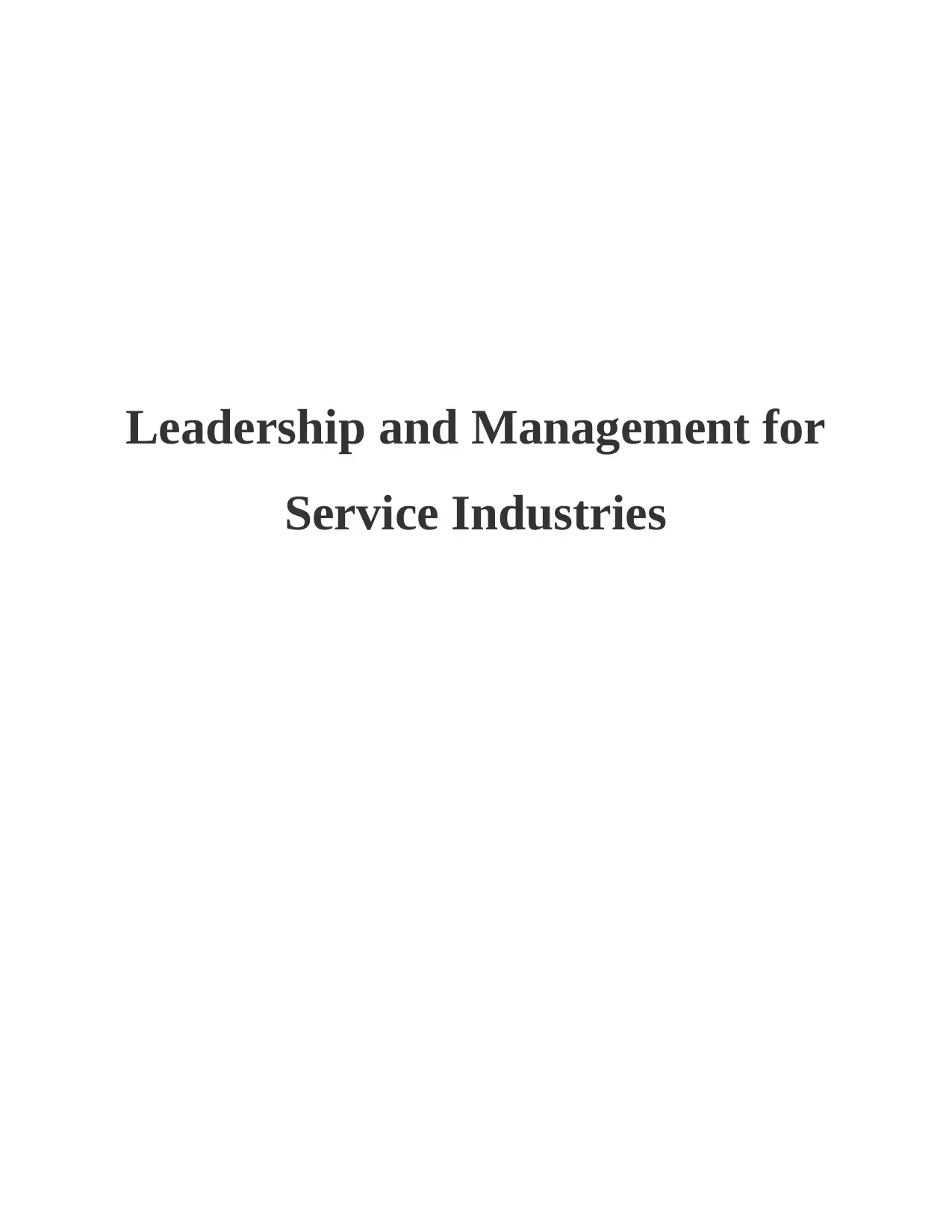
Leadership and Management for
Service Industries
Service Industries
Paraphrase This Document
Need a fresh take? Get an instant paraphrase of this document with our AI Paraphraser
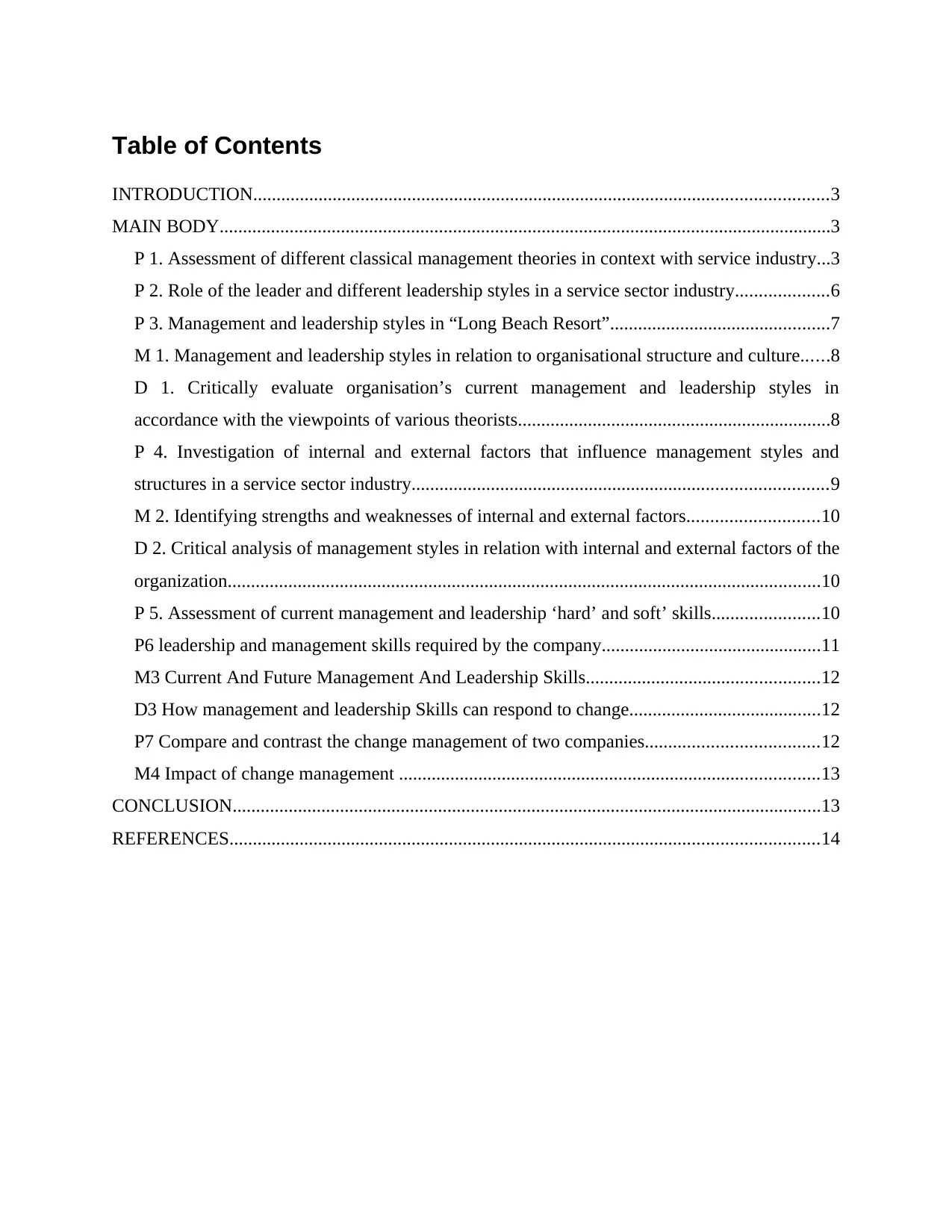
Table of Contents
INTRODUCTION...........................................................................................................................3
MAIN BODY...................................................................................................................................3
P 1. Assessment of different classical management theories in context with service industry...3
P 2. Role of the leader and different leadership styles in a service sector industry....................6
P 3. Management and leadership styles in “Long Beach Resort”...............................................7
M 1. Management and leadership styles in relation to organisational structure and culture......8
D 1. Critically evaluate organisation’s current management and leadership styles in
accordance with the viewpoints of various theorists...................................................................8
P 4. Investigation of internal and external factors that influence management styles and
structures in a service sector industry.........................................................................................9
M 2. Identifying strengths and weaknesses of internal and external factors............................10
D 2. Critical analysis of management styles in relation with internal and external factors of the
organization...............................................................................................................................10
P 5. Assessment of current management and leadership ‘hard’ and soft’ skills.......................10
P6 leadership and management skills required by the company...............................................11
M3 Current And Future Management And Leadership Skills..................................................12
D3 How management and leadership Skills can respond to change.........................................12
P7 Compare and contrast the change management of two companies.....................................12
M4 Impact of change management ..........................................................................................13
CONCLUSION..............................................................................................................................13
REFERENCES..............................................................................................................................14
INTRODUCTION...........................................................................................................................3
MAIN BODY...................................................................................................................................3
P 1. Assessment of different classical management theories in context with service industry...3
P 2. Role of the leader and different leadership styles in a service sector industry....................6
P 3. Management and leadership styles in “Long Beach Resort”...............................................7
M 1. Management and leadership styles in relation to organisational structure and culture......8
D 1. Critically evaluate organisation’s current management and leadership styles in
accordance with the viewpoints of various theorists...................................................................8
P 4. Investigation of internal and external factors that influence management styles and
structures in a service sector industry.........................................................................................9
M 2. Identifying strengths and weaknesses of internal and external factors............................10
D 2. Critical analysis of management styles in relation with internal and external factors of the
organization...............................................................................................................................10
P 5. Assessment of current management and leadership ‘hard’ and soft’ skills.......................10
P6 leadership and management skills required by the company...............................................11
M3 Current And Future Management And Leadership Skills..................................................12
D3 How management and leadership Skills can respond to change.........................................12
P7 Compare and contrast the change management of two companies.....................................12
M4 Impact of change management ..........................................................................................13
CONCLUSION..............................................................................................................................13
REFERENCES..............................................................................................................................14
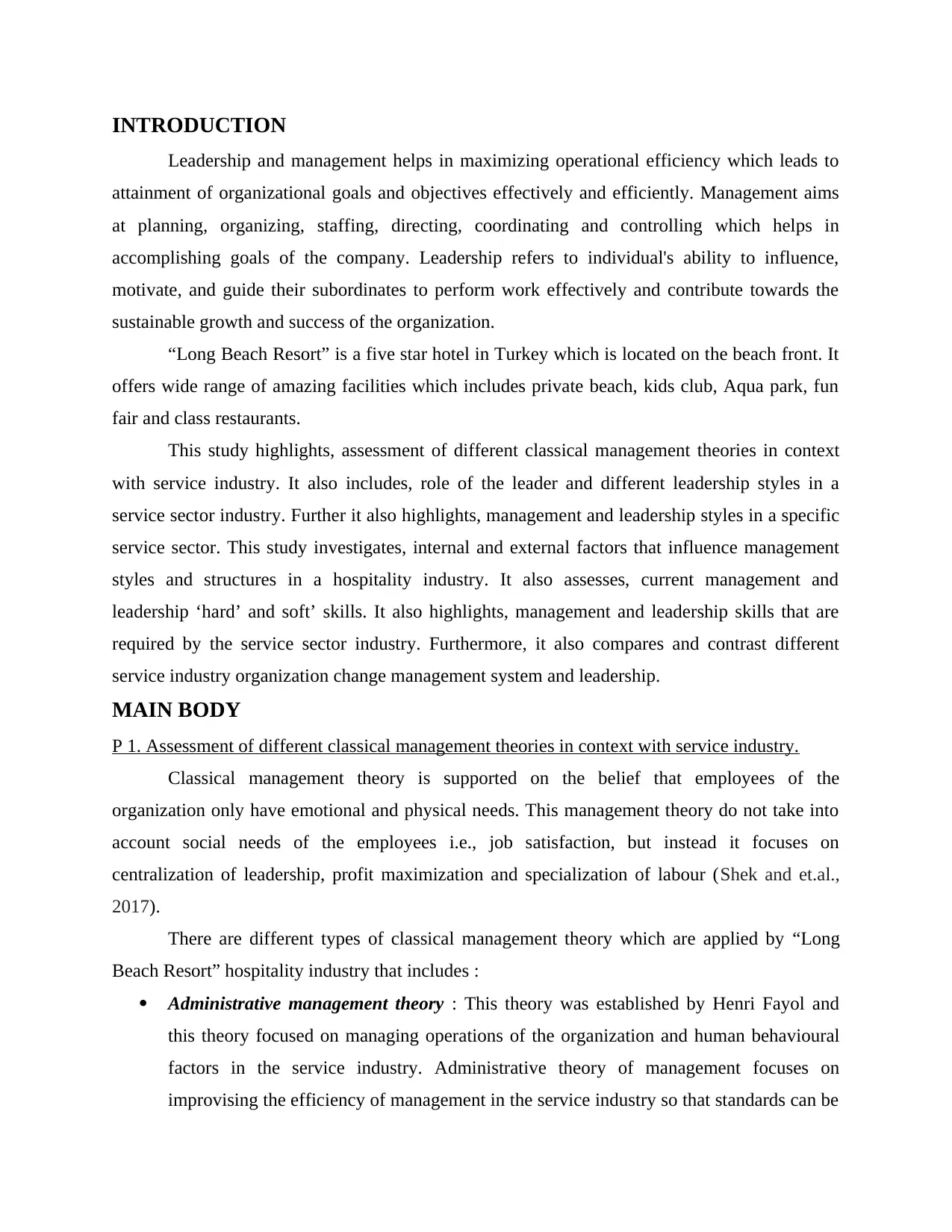
INTRODUCTION
Leadership and management helps in maximizing operational efficiency which leads to
attainment of organizational goals and objectives effectively and efficiently. Management aims
at planning, organizing, staffing, directing, coordinating and controlling which helps in
accomplishing goals of the company. Leadership refers to individual's ability to influence,
motivate, and guide their subordinates to perform work effectively and contribute towards the
sustainable growth and success of the organization.
“Long Beach Resort” is a five star hotel in Turkey which is located on the beach front. It
offers wide range of amazing facilities which includes private beach, kids club, Aqua park, fun
fair and class restaurants.
This study highlights, assessment of different classical management theories in context
with service industry. It also includes, role of the leader and different leadership styles in a
service sector industry. Further it also highlights, management and leadership styles in a specific
service sector. This study investigates, internal and external factors that influence management
styles and structures in a hospitality industry. It also assesses, current management and
leadership ‘hard’ and soft’ skills. It also highlights, management and leadership skills that are
required by the service sector industry. Furthermore, it also compares and contrast different
service industry organization change management system and leadership.
MAIN BODY
P 1. Assessment of different classical management theories in context with service industry.
Classical management theory is supported on the belief that employees of the
organization only have emotional and physical needs. This management theory do not take into
account social needs of the employees i.e., job satisfaction, but instead it focuses on
centralization of leadership, profit maximization and specialization of labour (Shek and et.al.,
2017).
There are different types of classical management theory which are applied by “Long
Beach Resort” hospitality industry that includes :
Administrative management theory : This theory was established by Henri Fayol and
this theory focused on managing operations of the organization and human behavioural
factors in the service industry. Administrative theory of management focuses on
improvising the efficiency of management in the service industry so that standards can be
Leadership and management helps in maximizing operational efficiency which leads to
attainment of organizational goals and objectives effectively and efficiently. Management aims
at planning, organizing, staffing, directing, coordinating and controlling which helps in
accomplishing goals of the company. Leadership refers to individual's ability to influence,
motivate, and guide their subordinates to perform work effectively and contribute towards the
sustainable growth and success of the organization.
“Long Beach Resort” is a five star hotel in Turkey which is located on the beach front. It
offers wide range of amazing facilities which includes private beach, kids club, Aqua park, fun
fair and class restaurants.
This study highlights, assessment of different classical management theories in context
with service industry. It also includes, role of the leader and different leadership styles in a
service sector industry. Further it also highlights, management and leadership styles in a specific
service sector. This study investigates, internal and external factors that influence management
styles and structures in a hospitality industry. It also assesses, current management and
leadership ‘hard’ and soft’ skills. It also highlights, management and leadership skills that are
required by the service sector industry. Furthermore, it also compares and contrast different
service industry organization change management system and leadership.
MAIN BODY
P 1. Assessment of different classical management theories in context with service industry.
Classical management theory is supported on the belief that employees of the
organization only have emotional and physical needs. This management theory do not take into
account social needs of the employees i.e., job satisfaction, but instead it focuses on
centralization of leadership, profit maximization and specialization of labour (Shek and et.al.,
2017).
There are different types of classical management theory which are applied by “Long
Beach Resort” hospitality industry that includes :
Administrative management theory : This theory was established by Henri Fayol and
this theory focused on managing operations of the organization and human behavioural
factors in the service industry. Administrative theory of management focuses on
improvising the efficiency of management in the service industry so that standards can be
You're viewing a preview
Unlock full access by subscribing today!
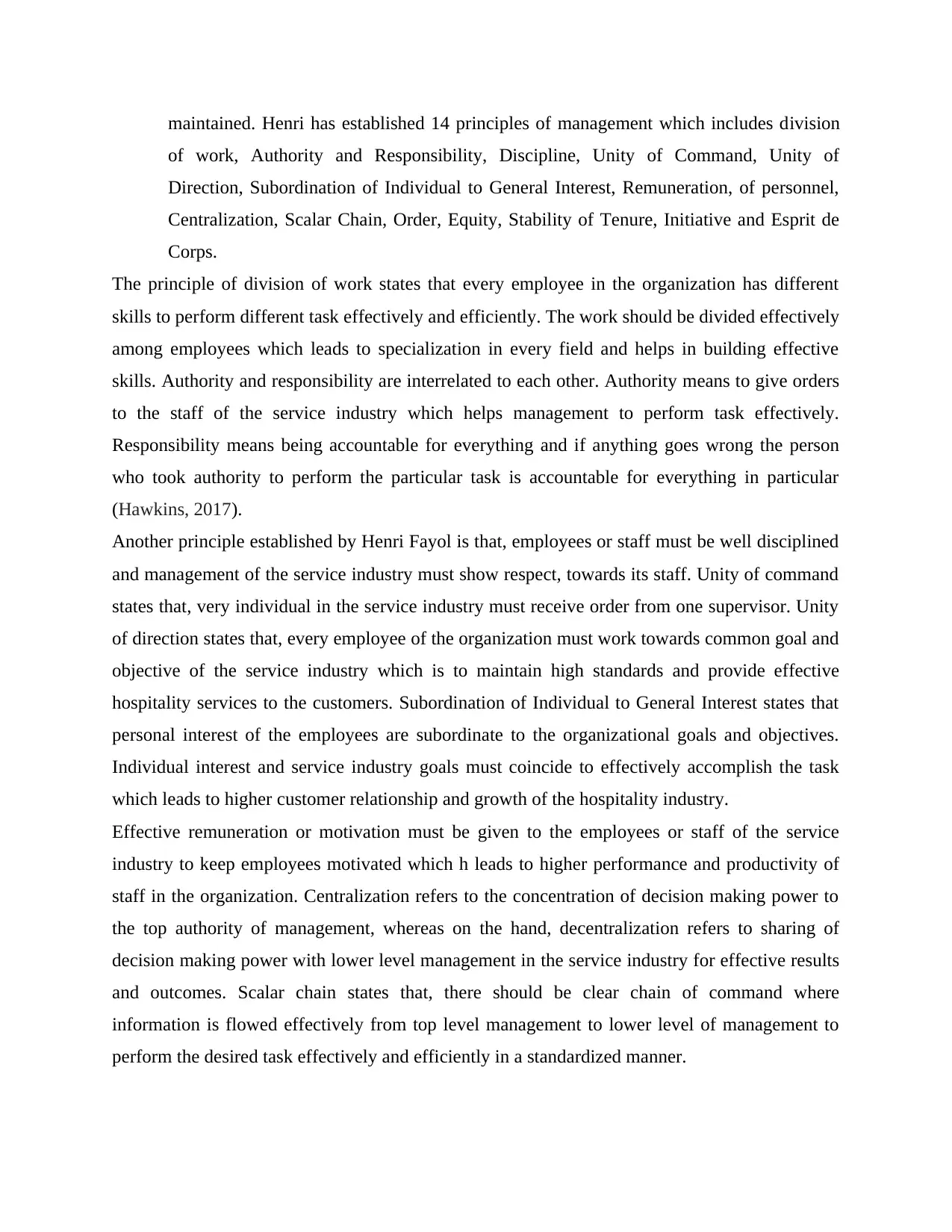
maintained. Henri has established 14 principles of management which includes division
of work, Authority and Responsibility, Discipline, Unity of Command, Unity of
Direction, Subordination of Individual to General Interest, Remuneration, of personnel,
Centralization, Scalar Chain, Order, Equity, Stability of Tenure, Initiative and Esprit de
Corps.
The principle of division of work states that every employee in the organization has different
skills to perform different task effectively and efficiently. The work should be divided effectively
among employees which leads to specialization in every field and helps in building effective
skills. Authority and responsibility are interrelated to each other. Authority means to give orders
to the staff of the service industry which helps management to perform task effectively.
Responsibility means being accountable for everything and if anything goes wrong the person
who took authority to perform the particular task is accountable for everything in particular
(Hawkins, 2017).
Another principle established by Henri Fayol is that, employees or staff must be well disciplined
and management of the service industry must show respect, towards its staff. Unity of command
states that, very individual in the service industry must receive order from one supervisor. Unity
of direction states that, every employee of the organization must work towards common goal and
objective of the service industry which is to maintain high standards and provide effective
hospitality services to the customers. Subordination of Individual to General Interest states that
personal interest of the employees are subordinate to the organizational goals and objectives.
Individual interest and service industry goals must coincide to effectively accomplish the task
which leads to higher customer relationship and growth of the hospitality industry.
Effective remuneration or motivation must be given to the employees or staff of the service
industry to keep employees motivated which h leads to higher performance and productivity of
staff in the organization. Centralization refers to the concentration of decision making power to
the top authority of management, whereas on the hand, decentralization refers to sharing of
decision making power with lower level management in the service industry for effective results
and outcomes. Scalar chain states that, there should be clear chain of command where
information is flowed effectively from top level management to lower level of management to
perform the desired task effectively and efficiently in a standardized manner.
of work, Authority and Responsibility, Discipline, Unity of Command, Unity of
Direction, Subordination of Individual to General Interest, Remuneration, of personnel,
Centralization, Scalar Chain, Order, Equity, Stability of Tenure, Initiative and Esprit de
Corps.
The principle of division of work states that every employee in the organization has different
skills to perform different task effectively and efficiently. The work should be divided effectively
among employees which leads to specialization in every field and helps in building effective
skills. Authority and responsibility are interrelated to each other. Authority means to give orders
to the staff of the service industry which helps management to perform task effectively.
Responsibility means being accountable for everything and if anything goes wrong the person
who took authority to perform the particular task is accountable for everything in particular
(Hawkins, 2017).
Another principle established by Henri Fayol is that, employees or staff must be well disciplined
and management of the service industry must show respect, towards its staff. Unity of command
states that, very individual in the service industry must receive order from one supervisor. Unity
of direction states that, every employee of the organization must work towards common goal and
objective of the service industry which is to maintain high standards and provide effective
hospitality services to the customers. Subordination of Individual to General Interest states that
personal interest of the employees are subordinate to the organizational goals and objectives.
Individual interest and service industry goals must coincide to effectively accomplish the task
which leads to higher customer relationship and growth of the hospitality industry.
Effective remuneration or motivation must be given to the employees or staff of the service
industry to keep employees motivated which h leads to higher performance and productivity of
staff in the organization. Centralization refers to the concentration of decision making power to
the top authority of management, whereas on the hand, decentralization refers to sharing of
decision making power with lower level management in the service industry for effective results
and outcomes. Scalar chain states that, there should be clear chain of command where
information is flowed effectively from top level management to lower level of management to
perform the desired task effectively and efficiently in a standardized manner.
Paraphrase This Document
Need a fresh take? Get an instant paraphrase of this document with our AI Paraphraser
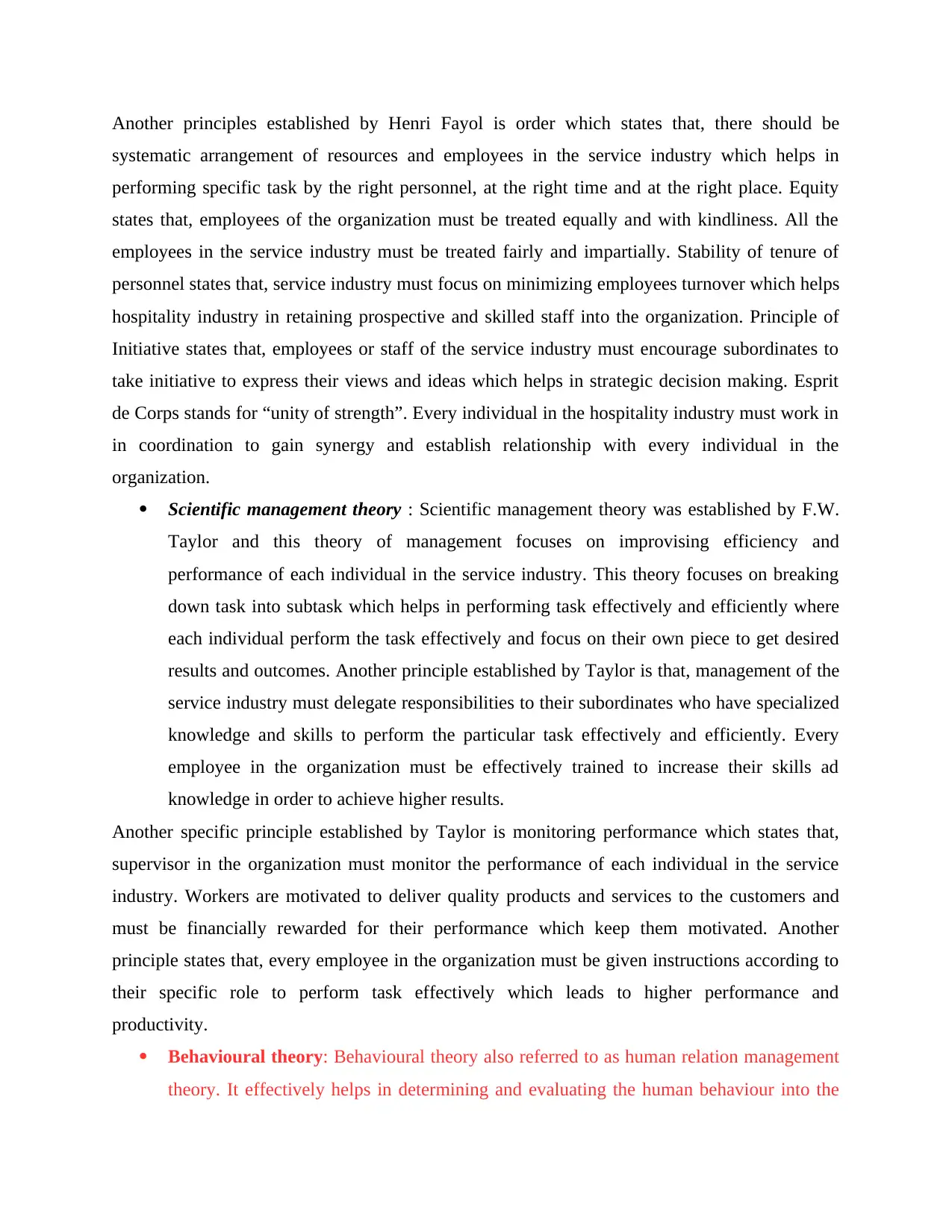
Another principles established by Henri Fayol is order which states that, there should be
systematic arrangement of resources and employees in the service industry which helps in
performing specific task by the right personnel, at the right time and at the right place. Equity
states that, employees of the organization must be treated equally and with kindliness. All the
employees in the service industry must be treated fairly and impartially. Stability of tenure of
personnel states that, service industry must focus on minimizing employees turnover which helps
hospitality industry in retaining prospective and skilled staff into the organization. Principle of
Initiative states that, employees or staff of the service industry must encourage subordinates to
take initiative to express their views and ideas which helps in strategic decision making. Esprit
de Corps stands for “unity of strength”. Every individual in the hospitality industry must work in
in coordination to gain synergy and establish relationship with every individual in the
organization.
Scientific management theory : Scientific management theory was established by F.W.
Taylor and this theory of management focuses on improvising efficiency and
performance of each individual in the service industry. This theory focuses on breaking
down task into subtask which helps in performing task effectively and efficiently where
each individual perform the task effectively and focus on their own piece to get desired
results and outcomes. Another principle established by Taylor is that, management of the
service industry must delegate responsibilities to their subordinates who have specialized
knowledge and skills to perform the particular task effectively and efficiently. Every
employee in the organization must be effectively trained to increase their skills ad
knowledge in order to achieve higher results.
Another specific principle established by Taylor is monitoring performance which states that,
supervisor in the organization must monitor the performance of each individual in the service
industry. Workers are motivated to deliver quality products and services to the customers and
must be financially rewarded for their performance which keep them motivated. Another
principle states that, every employee in the organization must be given instructions according to
their specific role to perform task effectively which leads to higher performance and
productivity.
Behavioural theory: Behavioural theory also referred to as human relation management
theory. It effectively helps in determining and evaluating the human behaviour into the
systematic arrangement of resources and employees in the service industry which helps in
performing specific task by the right personnel, at the right time and at the right place. Equity
states that, employees of the organization must be treated equally and with kindliness. All the
employees in the service industry must be treated fairly and impartially. Stability of tenure of
personnel states that, service industry must focus on minimizing employees turnover which helps
hospitality industry in retaining prospective and skilled staff into the organization. Principle of
Initiative states that, employees or staff of the service industry must encourage subordinates to
take initiative to express their views and ideas which helps in strategic decision making. Esprit
de Corps stands for “unity of strength”. Every individual in the hospitality industry must work in
in coordination to gain synergy and establish relationship with every individual in the
organization.
Scientific management theory : Scientific management theory was established by F.W.
Taylor and this theory of management focuses on improvising efficiency and
performance of each individual in the service industry. This theory focuses on breaking
down task into subtask which helps in performing task effectively and efficiently where
each individual perform the task effectively and focus on their own piece to get desired
results and outcomes. Another principle established by Taylor is that, management of the
service industry must delegate responsibilities to their subordinates who have specialized
knowledge and skills to perform the particular task effectively and efficiently. Every
employee in the organization must be effectively trained to increase their skills ad
knowledge in order to achieve higher results.
Another specific principle established by Taylor is monitoring performance which states that,
supervisor in the organization must monitor the performance of each individual in the service
industry. Workers are motivated to deliver quality products and services to the customers and
must be financially rewarded for their performance which keep them motivated. Another
principle states that, every employee in the organization must be given instructions according to
their specific role to perform task effectively which leads to higher performance and
productivity.
Behavioural theory: Behavioural theory also referred to as human relation management
theory. It effectively helps in determining and evaluating the human behaviour into the
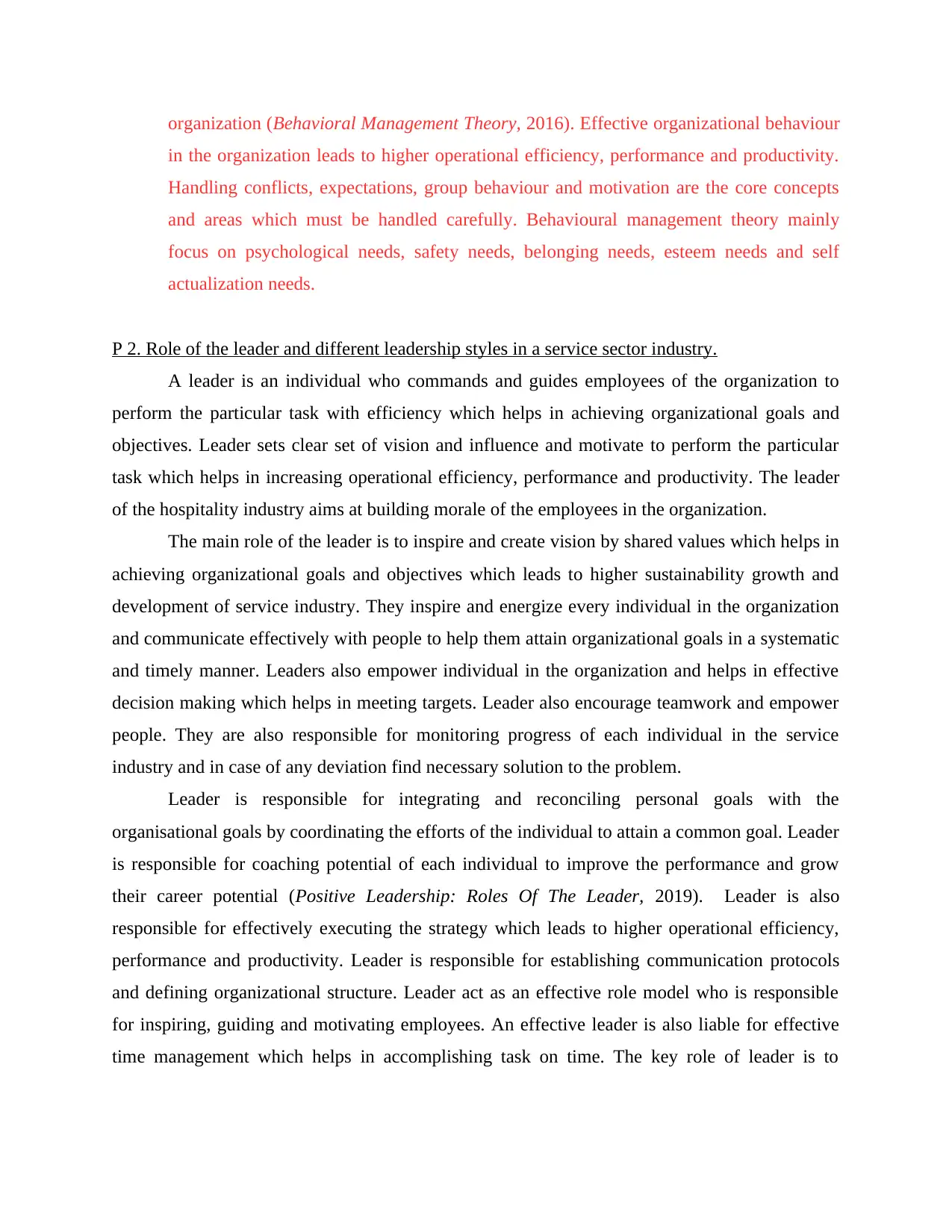
organization (Behavioral Management Theory, 2016). Effective organizational behaviour
in the organization leads to higher operational efficiency, performance and productivity.
Handling conflicts, expectations, group behaviour and motivation are the core concepts
and areas which must be handled carefully. Behavioural management theory mainly
focus on psychological needs, safety needs, belonging needs, esteem needs and self
actualization needs.
P 2. Role of the leader and different leadership styles in a service sector industry.
A leader is an individual who commands and guides employees of the organization to
perform the particular task with efficiency which helps in achieving organizational goals and
objectives. Leader sets clear set of vision and influence and motivate to perform the particular
task which helps in increasing operational efficiency, performance and productivity. The leader
of the hospitality industry aims at building morale of the employees in the organization.
The main role of the leader is to inspire and create vision by shared values which helps in
achieving organizational goals and objectives which leads to higher sustainability growth and
development of service industry. They inspire and energize every individual in the organization
and communicate effectively with people to help them attain organizational goals in a systematic
and timely manner. Leaders also empower individual in the organization and helps in effective
decision making which helps in meeting targets. Leader also encourage teamwork and empower
people. They are also responsible for monitoring progress of each individual in the service
industry and in case of any deviation find necessary solution to the problem.
Leader is responsible for integrating and reconciling personal goals with the
organisational goals by coordinating the efforts of the individual to attain a common goal. Leader
is responsible for coaching potential of each individual to improve the performance and grow
their career potential (Positive Leadership: Roles Of The Leader, 2019). Leader is also
responsible for effectively executing the strategy which leads to higher operational efficiency,
performance and productivity. Leader is responsible for establishing communication protocols
and defining organizational structure. Leader act as an effective role model who is responsible
for inspiring, guiding and motivating employees. An effective leader is also liable for effective
time management which helps in accomplishing task on time. The key role of leader is to
in the organization leads to higher operational efficiency, performance and productivity.
Handling conflicts, expectations, group behaviour and motivation are the core concepts
and areas which must be handled carefully. Behavioural management theory mainly
focus on psychological needs, safety needs, belonging needs, esteem needs and self
actualization needs.
P 2. Role of the leader and different leadership styles in a service sector industry.
A leader is an individual who commands and guides employees of the organization to
perform the particular task with efficiency which helps in achieving organizational goals and
objectives. Leader sets clear set of vision and influence and motivate to perform the particular
task which helps in increasing operational efficiency, performance and productivity. The leader
of the hospitality industry aims at building morale of the employees in the organization.
The main role of the leader is to inspire and create vision by shared values which helps in
achieving organizational goals and objectives which leads to higher sustainability growth and
development of service industry. They inspire and energize every individual in the organization
and communicate effectively with people to help them attain organizational goals in a systematic
and timely manner. Leaders also empower individual in the organization and helps in effective
decision making which helps in meeting targets. Leader also encourage teamwork and empower
people. They are also responsible for monitoring progress of each individual in the service
industry and in case of any deviation find necessary solution to the problem.
Leader is responsible for integrating and reconciling personal goals with the
organisational goals by coordinating the efforts of the individual to attain a common goal. Leader
is responsible for coaching potential of each individual to improve the performance and grow
their career potential (Positive Leadership: Roles Of The Leader, 2019). Leader is also
responsible for effectively executing the strategy which leads to higher operational efficiency,
performance and productivity. Leader is responsible for establishing communication protocols
and defining organizational structure. Leader act as an effective role model who is responsible
for inspiring, guiding and motivating employees. An effective leader is also liable for effective
time management which helps in accomplishing task on time. The key role of leader is to
You're viewing a preview
Unlock full access by subscribing today!
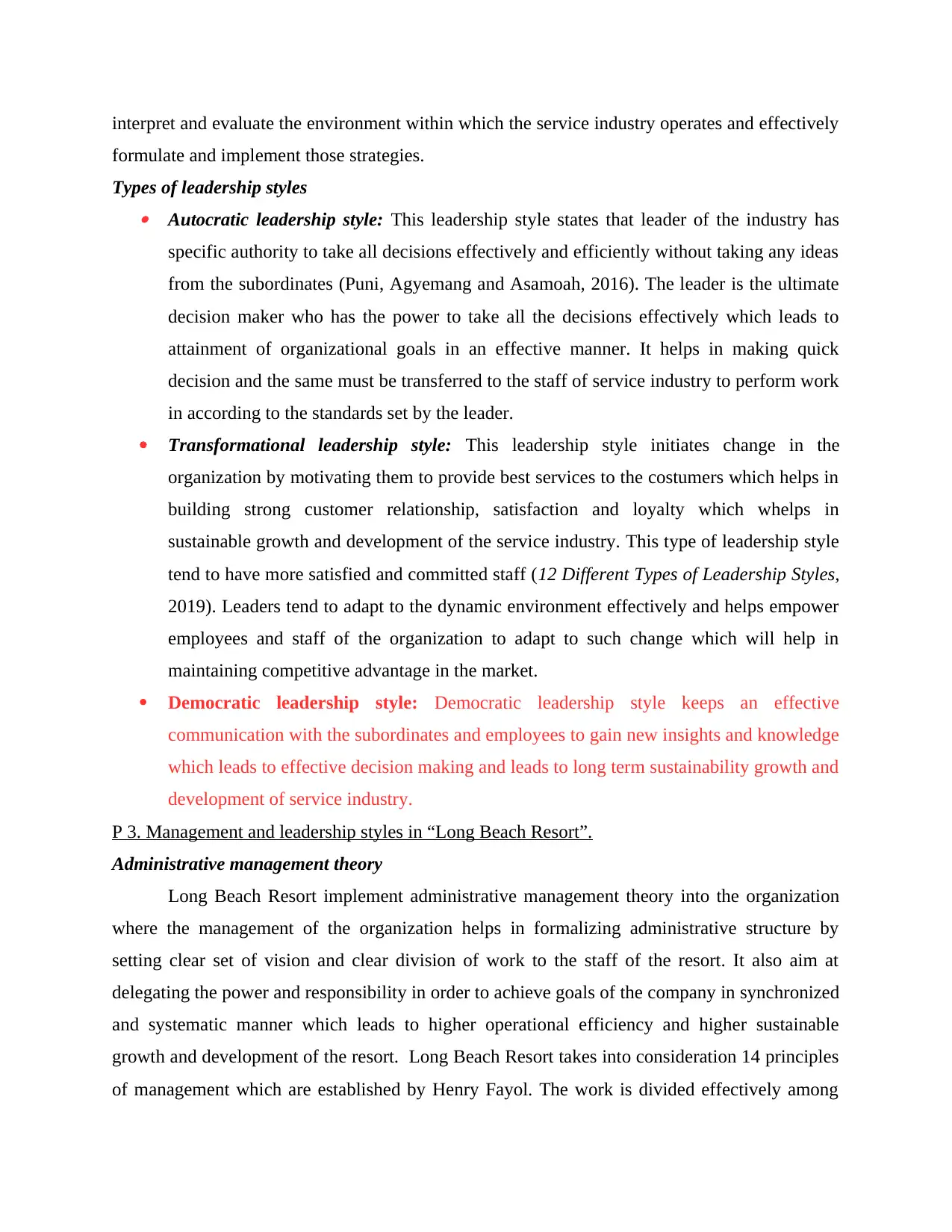
interpret and evaluate the environment within which the service industry operates and effectively
formulate and implement those strategies.
Types of leadership styles Autocratic leadership style: This leadership style states that leader of the industry has
specific authority to take all decisions effectively and efficiently without taking any ideas
from the subordinates (Puni, Agyemang and Asamoah, 2016). The leader is the ultimate
decision maker who has the power to take all the decisions effectively which leads to
attainment of organizational goals in an effective manner. It helps in making quick
decision and the same must be transferred to the staff of service industry to perform work
in according to the standards set by the leader.
Transformational leadership style: This leadership style initiates change in the
organization by motivating them to provide best services to the costumers which helps in
building strong customer relationship, satisfaction and loyalty which whelps in
sustainable growth and development of the service industry. This type of leadership style
tend to have more satisfied and committed staff (12 Different Types of Leadership Styles,
2019). Leaders tend to adapt to the dynamic environment effectively and helps empower
employees and staff of the organization to adapt to such change which will help in
maintaining competitive advantage in the market.
Democratic leadership style: Democratic leadership style keeps an effective
communication with the subordinates and employees to gain new insights and knowledge
which leads to effective decision making and leads to long term sustainability growth and
development of service industry.
P 3. Management and leadership styles in “Long Beach Resort”.
Administrative management theory
Long Beach Resort implement administrative management theory into the organization
where the management of the organization helps in formalizing administrative structure by
setting clear set of vision and clear division of work to the staff of the resort. It also aim at
delegating the power and responsibility in order to achieve goals of the company in synchronized
and systematic manner which leads to higher operational efficiency and higher sustainable
growth and development of the resort. Long Beach Resort takes into consideration 14 principles
of management which are established by Henry Fayol. The work is divided effectively among
formulate and implement those strategies.
Types of leadership styles Autocratic leadership style: This leadership style states that leader of the industry has
specific authority to take all decisions effectively and efficiently without taking any ideas
from the subordinates (Puni, Agyemang and Asamoah, 2016). The leader is the ultimate
decision maker who has the power to take all the decisions effectively which leads to
attainment of organizational goals in an effective manner. It helps in making quick
decision and the same must be transferred to the staff of service industry to perform work
in according to the standards set by the leader.
Transformational leadership style: This leadership style initiates change in the
organization by motivating them to provide best services to the costumers which helps in
building strong customer relationship, satisfaction and loyalty which whelps in
sustainable growth and development of the service industry. This type of leadership style
tend to have more satisfied and committed staff (12 Different Types of Leadership Styles,
2019). Leaders tend to adapt to the dynamic environment effectively and helps empower
employees and staff of the organization to adapt to such change which will help in
maintaining competitive advantage in the market.
Democratic leadership style: Democratic leadership style keeps an effective
communication with the subordinates and employees to gain new insights and knowledge
which leads to effective decision making and leads to long term sustainability growth and
development of service industry.
P 3. Management and leadership styles in “Long Beach Resort”.
Administrative management theory
Long Beach Resort implement administrative management theory into the organization
where the management of the organization helps in formalizing administrative structure by
setting clear set of vision and clear division of work to the staff of the resort. It also aim at
delegating the power and responsibility in order to achieve goals of the company in synchronized
and systematic manner which leads to higher operational efficiency and higher sustainable
growth and development of the resort. Long Beach Resort takes into consideration 14 principles
of management which are established by Henry Fayol. The work is divided effectively among
Paraphrase This Document
Need a fresh take? Get an instant paraphrase of this document with our AI Paraphraser
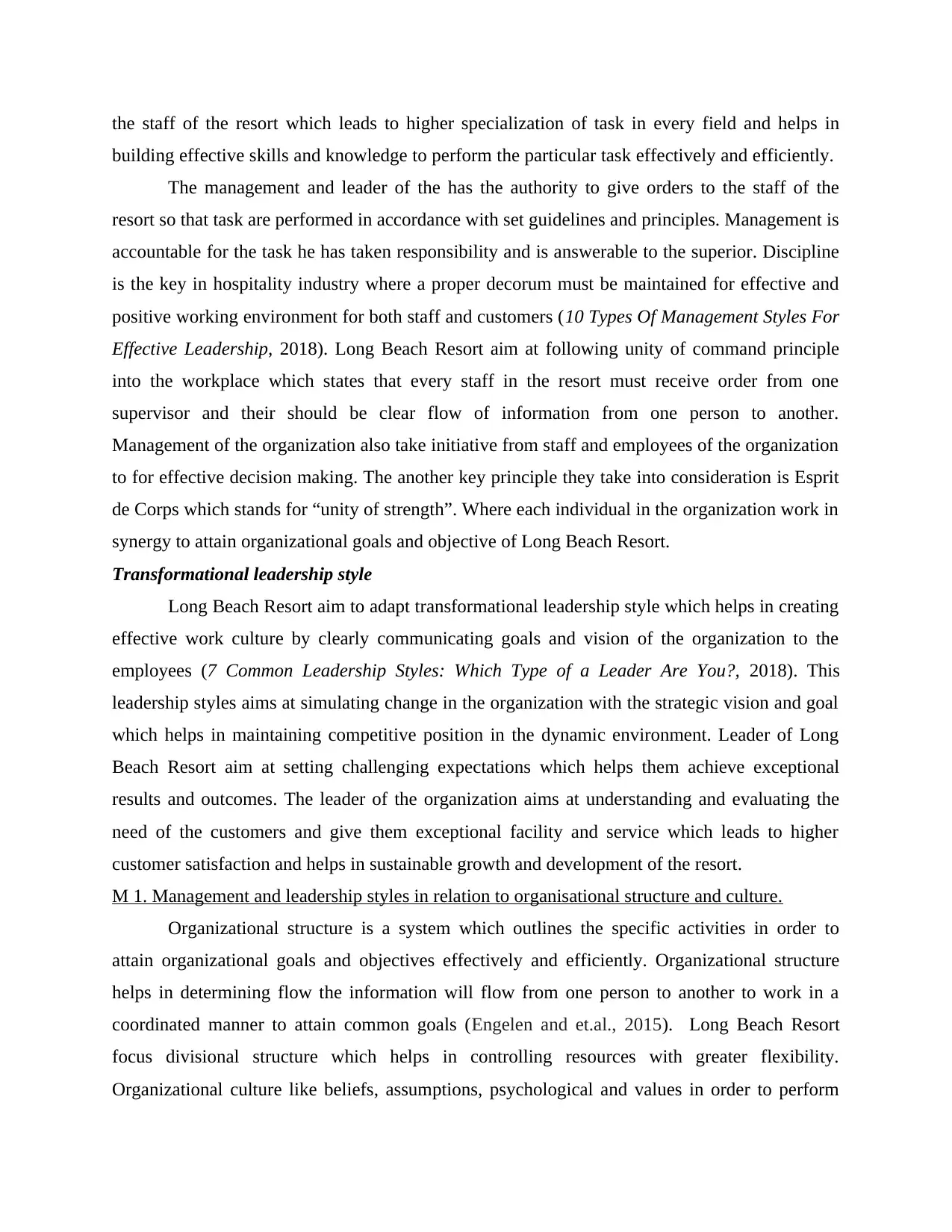
the staff of the resort which leads to higher specialization of task in every field and helps in
building effective skills and knowledge to perform the particular task effectively and efficiently.
The management and leader of the has the authority to give orders to the staff of the
resort so that task are performed in accordance with set guidelines and principles. Management is
accountable for the task he has taken responsibility and is answerable to the superior. Discipline
is the key in hospitality industry where a proper decorum must be maintained for effective and
positive working environment for both staff and customers (10 Types Of Management Styles For
Effective Leadership, 2018). Long Beach Resort aim at following unity of command principle
into the workplace which states that every staff in the resort must receive order from one
supervisor and their should be clear flow of information from one person to another.
Management of the organization also take initiative from staff and employees of the organization
to for effective decision making. The another key principle they take into consideration is Esprit
de Corps which stands for “unity of strength”. Where each individual in the organization work in
synergy to attain organizational goals and objective of Long Beach Resort.
Transformational leadership style
Long Beach Resort aim to adapt transformational leadership style which helps in creating
effective work culture by clearly communicating goals and vision of the organization to the
employees (7 Common Leadership Styles: Which Type of a Leader Are You?, 2018). This
leadership styles aims at simulating change in the organization with the strategic vision and goal
which helps in maintaining competitive position in the dynamic environment. Leader of Long
Beach Resort aim at setting challenging expectations which helps them achieve exceptional
results and outcomes. The leader of the organization aims at understanding and evaluating the
need of the customers and give them exceptional facility and service which leads to higher
customer satisfaction and helps in sustainable growth and development of the resort.
M 1. Management and leadership styles in relation to organisational structure and culture.
Organizational structure is a system which outlines the specific activities in order to
attain organizational goals and objectives effectively and efficiently. Organizational structure
helps in determining flow the information will flow from one person to another to work in a
coordinated manner to attain common goals (Engelen and et.al., 2015). Long Beach Resort
focus divisional structure which helps in controlling resources with greater flexibility.
Organizational culture like beliefs, assumptions, psychological and values in order to perform
building effective skills and knowledge to perform the particular task effectively and efficiently.
The management and leader of the has the authority to give orders to the staff of the
resort so that task are performed in accordance with set guidelines and principles. Management is
accountable for the task he has taken responsibility and is answerable to the superior. Discipline
is the key in hospitality industry where a proper decorum must be maintained for effective and
positive working environment for both staff and customers (10 Types Of Management Styles For
Effective Leadership, 2018). Long Beach Resort aim at following unity of command principle
into the workplace which states that every staff in the resort must receive order from one
supervisor and their should be clear flow of information from one person to another.
Management of the organization also take initiative from staff and employees of the organization
to for effective decision making. The another key principle they take into consideration is Esprit
de Corps which stands for “unity of strength”. Where each individual in the organization work in
synergy to attain organizational goals and objective of Long Beach Resort.
Transformational leadership style
Long Beach Resort aim to adapt transformational leadership style which helps in creating
effective work culture by clearly communicating goals and vision of the organization to the
employees (7 Common Leadership Styles: Which Type of a Leader Are You?, 2018). This
leadership styles aims at simulating change in the organization with the strategic vision and goal
which helps in maintaining competitive position in the dynamic environment. Leader of Long
Beach Resort aim at setting challenging expectations which helps them achieve exceptional
results and outcomes. The leader of the organization aims at understanding and evaluating the
need of the customers and give them exceptional facility and service which leads to higher
customer satisfaction and helps in sustainable growth and development of the resort.
M 1. Management and leadership styles in relation to organisational structure and culture.
Organizational structure is a system which outlines the specific activities in order to
attain organizational goals and objectives effectively and efficiently. Organizational structure
helps in determining flow the information will flow from one person to another to work in a
coordinated manner to attain common goals (Engelen and et.al., 2015). Long Beach Resort
focus divisional structure which helps in controlling resources with greater flexibility.
Organizational culture like beliefs, assumptions, psychological and values in order to perform
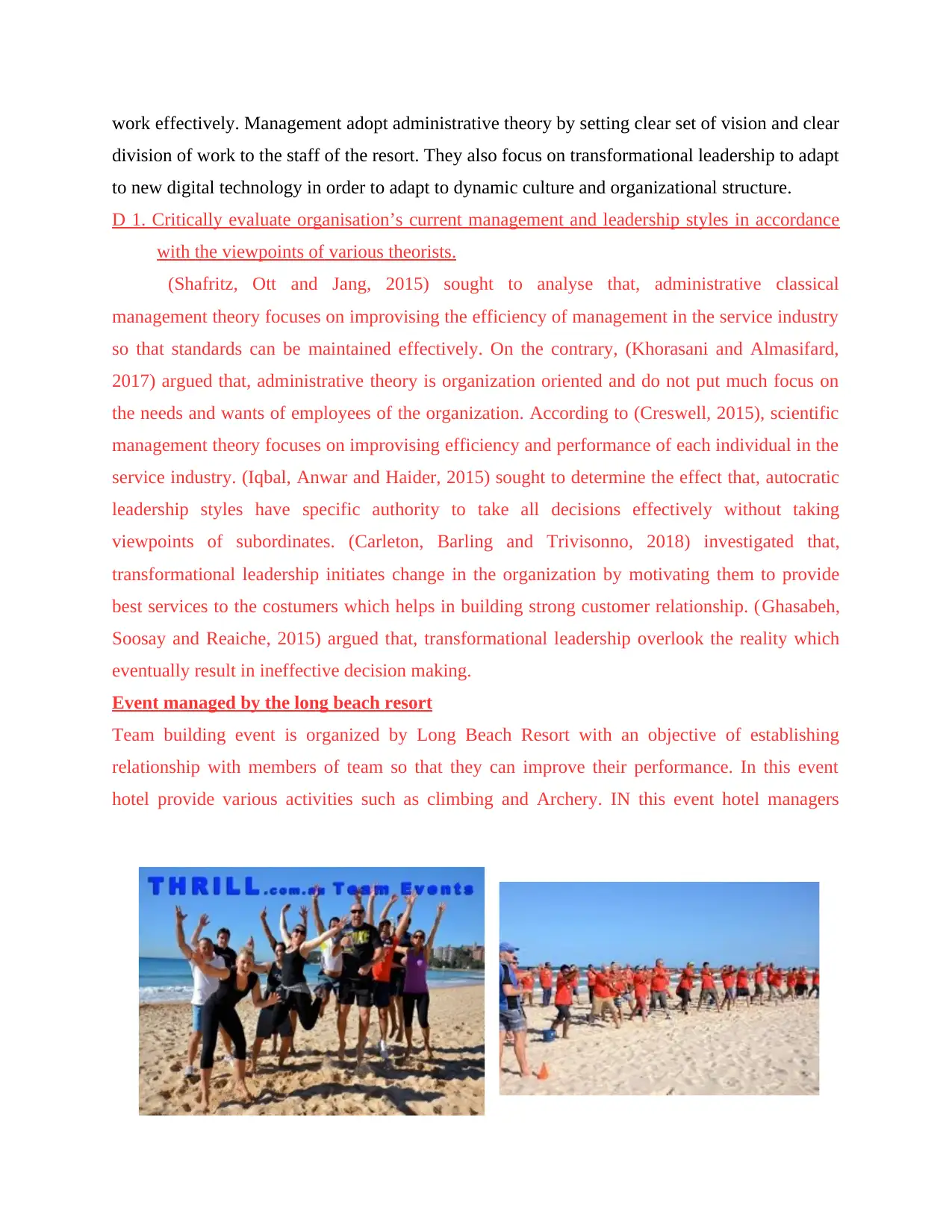
work effectively. Management adopt administrative theory by setting clear set of vision and clear
division of work to the staff of the resort. They also focus on transformational leadership to adapt
to new digital technology in order to adapt to dynamic culture and organizational structure.
D 1. Critically evaluate organisation’s current management and leadership styles in accordance
with the viewpoints of various theorists.
(Shafritz, Ott and Jang, 2015) sought to analyse that, administrative classical
management theory focuses on improvising the efficiency of management in the service industry
so that standards can be maintained effectively. On the contrary, (Khorasani and Almasifard,
2017) argued that, administrative theory is organization oriented and do not put much focus on
the needs and wants of employees of the organization. According to (Creswell, 2015), scientific
management theory focuses on improvising efficiency and performance of each individual in the
service industry. (Iqbal, Anwar and Haider, 2015) sought to determine the effect that, autocratic
leadership styles have specific authority to take all decisions effectively without taking
viewpoints of subordinates. (Carleton, Barling and Trivisonno, 2018) investigated that,
transformational leadership initiates change in the organization by motivating them to provide
best services to the costumers which helps in building strong customer relationship. (Ghasabeh,
Soosay and Reaiche, 2015) argued that, transformational leadership overlook the reality which
eventually result in ineffective decision making.
Event managed by the long beach resort
Team building event is organized by Long Beach Resort with an objective of establishing
relationship with members of team so that they can improve their performance. In this event
hotel provide various activities such as climbing and Archery. IN this event hotel managers
division of work to the staff of the resort. They also focus on transformational leadership to adapt
to new digital technology in order to adapt to dynamic culture and organizational structure.
D 1. Critically evaluate organisation’s current management and leadership styles in accordance
with the viewpoints of various theorists.
(Shafritz, Ott and Jang, 2015) sought to analyse that, administrative classical
management theory focuses on improvising the efficiency of management in the service industry
so that standards can be maintained effectively. On the contrary, (Khorasani and Almasifard,
2017) argued that, administrative theory is organization oriented and do not put much focus on
the needs and wants of employees of the organization. According to (Creswell, 2015), scientific
management theory focuses on improvising efficiency and performance of each individual in the
service industry. (Iqbal, Anwar and Haider, 2015) sought to determine the effect that, autocratic
leadership styles have specific authority to take all decisions effectively without taking
viewpoints of subordinates. (Carleton, Barling and Trivisonno, 2018) investigated that,
transformational leadership initiates change in the organization by motivating them to provide
best services to the costumers which helps in building strong customer relationship. (Ghasabeh,
Soosay and Reaiche, 2015) argued that, transformational leadership overlook the reality which
eventually result in ineffective decision making.
Event managed by the long beach resort
Team building event is organized by Long Beach Resort with an objective of establishing
relationship with members of team so that they can improve their performance. In this event
hotel provide various activities such as climbing and Archery. IN this event hotel managers
You're viewing a preview
Unlock full access by subscribing today!
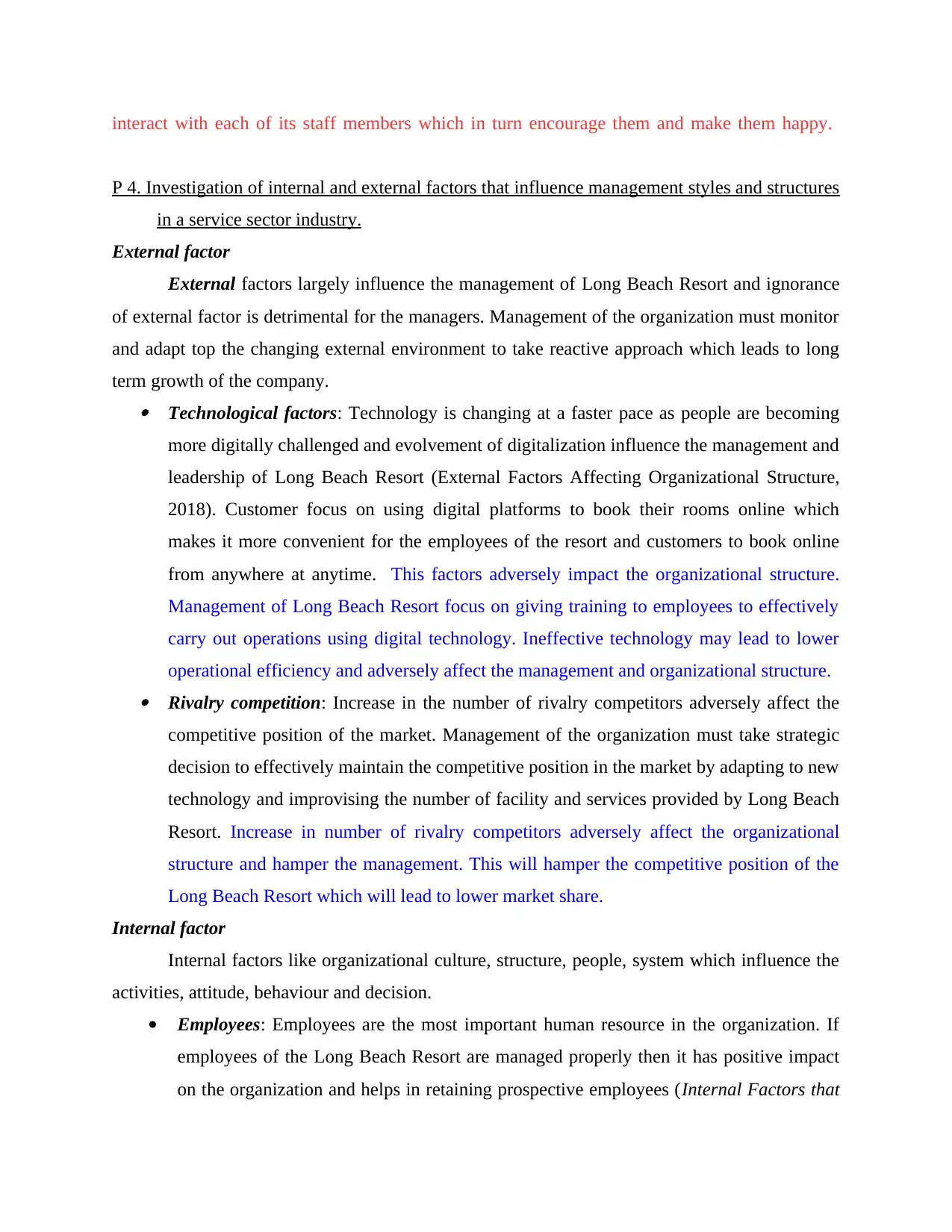
interact with each of its staff members which in turn encourage them and make them happy.
P 4. Investigation of internal and external factors that influence management styles and structures
in a service sector industry.
External factor
External factors largely influence the management of Long Beach Resort and ignorance
of external factor is detrimental for the managers. Management of the organization must monitor
and adapt top the changing external environment to take reactive approach which leads to long
term growth of the company. Technological factors: Technology is changing at a faster pace as people are becoming
more digitally challenged and evolvement of digitalization influence the management and
leadership of Long Beach Resort (External Factors Affecting Organizational Structure,
2018). Customer focus on using digital platforms to book their rooms online which
makes it more convenient for the employees of the resort and customers to book online
from anywhere at anytime. This factors adversely impact the organizational structure.
Management of Long Beach Resort focus on giving training to employees to effectively
carry out operations using digital technology. Ineffective technology may lead to lower
operational efficiency and adversely affect the management and organizational structure. Rivalry competition: Increase in the number of rivalry competitors adversely affect the
competitive position of the market. Management of the organization must take strategic
decision to effectively maintain the competitive position in the market by adapting to new
technology and improvising the number of facility and services provided by Long Beach
Resort. Increase in number of rivalry competitors adversely affect the organizational
structure and hamper the management. This will hamper the competitive position of the
Long Beach Resort which will lead to lower market share.
Internal factor
Internal factors like organizational culture, structure, people, system which influence the
activities, attitude, behaviour and decision.
Employees: Employees are the most important human resource in the organization. If
employees of the Long Beach Resort are managed properly then it has positive impact
on the organization and helps in retaining prospective employees (Internal Factors that
P 4. Investigation of internal and external factors that influence management styles and structures
in a service sector industry.
External factor
External factors largely influence the management of Long Beach Resort and ignorance
of external factor is detrimental for the managers. Management of the organization must monitor
and adapt top the changing external environment to take reactive approach which leads to long
term growth of the company. Technological factors: Technology is changing at a faster pace as people are becoming
more digitally challenged and evolvement of digitalization influence the management and
leadership of Long Beach Resort (External Factors Affecting Organizational Structure,
2018). Customer focus on using digital platforms to book their rooms online which
makes it more convenient for the employees of the resort and customers to book online
from anywhere at anytime. This factors adversely impact the organizational structure.
Management of Long Beach Resort focus on giving training to employees to effectively
carry out operations using digital technology. Ineffective technology may lead to lower
operational efficiency and adversely affect the management and organizational structure. Rivalry competition: Increase in the number of rivalry competitors adversely affect the
competitive position of the market. Management of the organization must take strategic
decision to effectively maintain the competitive position in the market by adapting to new
technology and improvising the number of facility and services provided by Long Beach
Resort. Increase in number of rivalry competitors adversely affect the organizational
structure and hamper the management. This will hamper the competitive position of the
Long Beach Resort which will lead to lower market share.
Internal factor
Internal factors like organizational culture, structure, people, system which influence the
activities, attitude, behaviour and decision.
Employees: Employees are the most important human resource in the organization. If
employees of the Long Beach Resort are managed properly then it has positive impact
on the organization and helps in retaining prospective employees (Internal Factors that
Paraphrase This Document
Need a fresh take? Get an instant paraphrase of this document with our AI Paraphraser
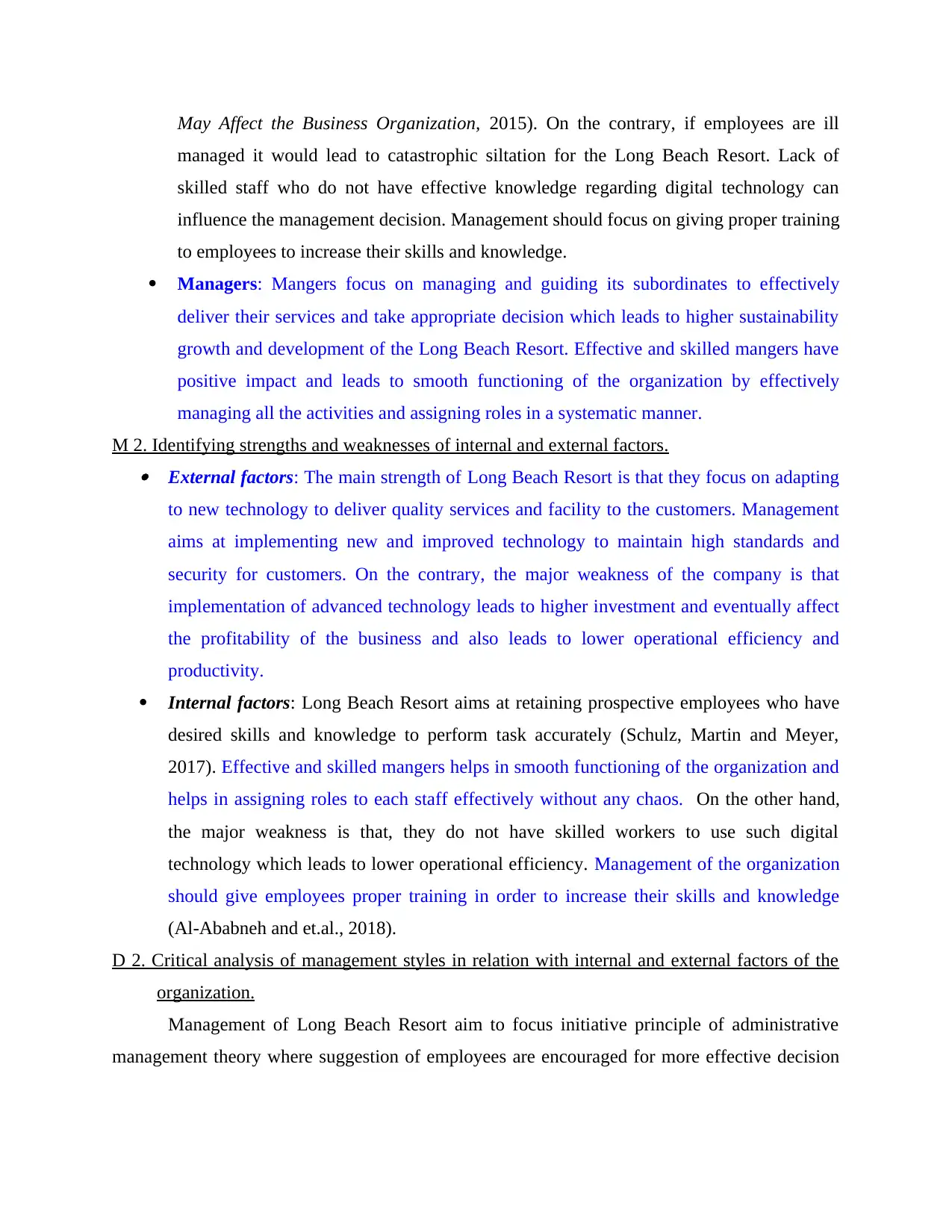
May Affect the Business Organization, 2015). On the contrary, if employees are ill
managed it would lead to catastrophic siltation for the Long Beach Resort. Lack of
skilled staff who do not have effective knowledge regarding digital technology can
influence the management decision. Management should focus on giving proper training
to employees to increase their skills and knowledge.
Managers: Mangers focus on managing and guiding its subordinates to effectively
deliver their services and take appropriate decision which leads to higher sustainability
growth and development of the Long Beach Resort. Effective and skilled mangers have
positive impact and leads to smooth functioning of the organization by effectively
managing all the activities and assigning roles in a systematic manner.
M 2. Identifying strengths and weaknesses of internal and external factors. External factors: The main strength of Long Beach Resort is that they focus on adapting
to new technology to deliver quality services and facility to the customers. Management
aims at implementing new and improved technology to maintain high standards and
security for customers. On the contrary, the major weakness of the company is that
implementation of advanced technology leads to higher investment and eventually affect
the profitability of the business and also leads to lower operational efficiency and
productivity.
Internal factors: Long Beach Resort aims at retaining prospective employees who have
desired skills and knowledge to perform task accurately (Schulz, Martin and Meyer,
2017). Effective and skilled mangers helps in smooth functioning of the organization and
helps in assigning roles to each staff effectively without any chaos. On the other hand,
the major weakness is that, they do not have skilled workers to use such digital
technology which leads to lower operational efficiency. Management of the organization
should give employees proper training in order to increase their skills and knowledge
(Al-Ababneh and et.al., 2018).
D 2. Critical analysis of management styles in relation with internal and external factors of the
organization.
Management of Long Beach Resort aim to focus initiative principle of administrative
management theory where suggestion of employees are encouraged for more effective decision
managed it would lead to catastrophic siltation for the Long Beach Resort. Lack of
skilled staff who do not have effective knowledge regarding digital technology can
influence the management decision. Management should focus on giving proper training
to employees to increase their skills and knowledge.
Managers: Mangers focus on managing and guiding its subordinates to effectively
deliver their services and take appropriate decision which leads to higher sustainability
growth and development of the Long Beach Resort. Effective and skilled mangers have
positive impact and leads to smooth functioning of the organization by effectively
managing all the activities and assigning roles in a systematic manner.
M 2. Identifying strengths and weaknesses of internal and external factors. External factors: The main strength of Long Beach Resort is that they focus on adapting
to new technology to deliver quality services and facility to the customers. Management
aims at implementing new and improved technology to maintain high standards and
security for customers. On the contrary, the major weakness of the company is that
implementation of advanced technology leads to higher investment and eventually affect
the profitability of the business and also leads to lower operational efficiency and
productivity.
Internal factors: Long Beach Resort aims at retaining prospective employees who have
desired skills and knowledge to perform task accurately (Schulz, Martin and Meyer,
2017). Effective and skilled mangers helps in smooth functioning of the organization and
helps in assigning roles to each staff effectively without any chaos. On the other hand,
the major weakness is that, they do not have skilled workers to use such digital
technology which leads to lower operational efficiency. Management of the organization
should give employees proper training in order to increase their skills and knowledge
(Al-Ababneh and et.al., 2018).
D 2. Critical analysis of management styles in relation with internal and external factors of the
organization.
Management of Long Beach Resort aim to focus initiative principle of administrative
management theory where suggestion of employees are encouraged for more effective decision
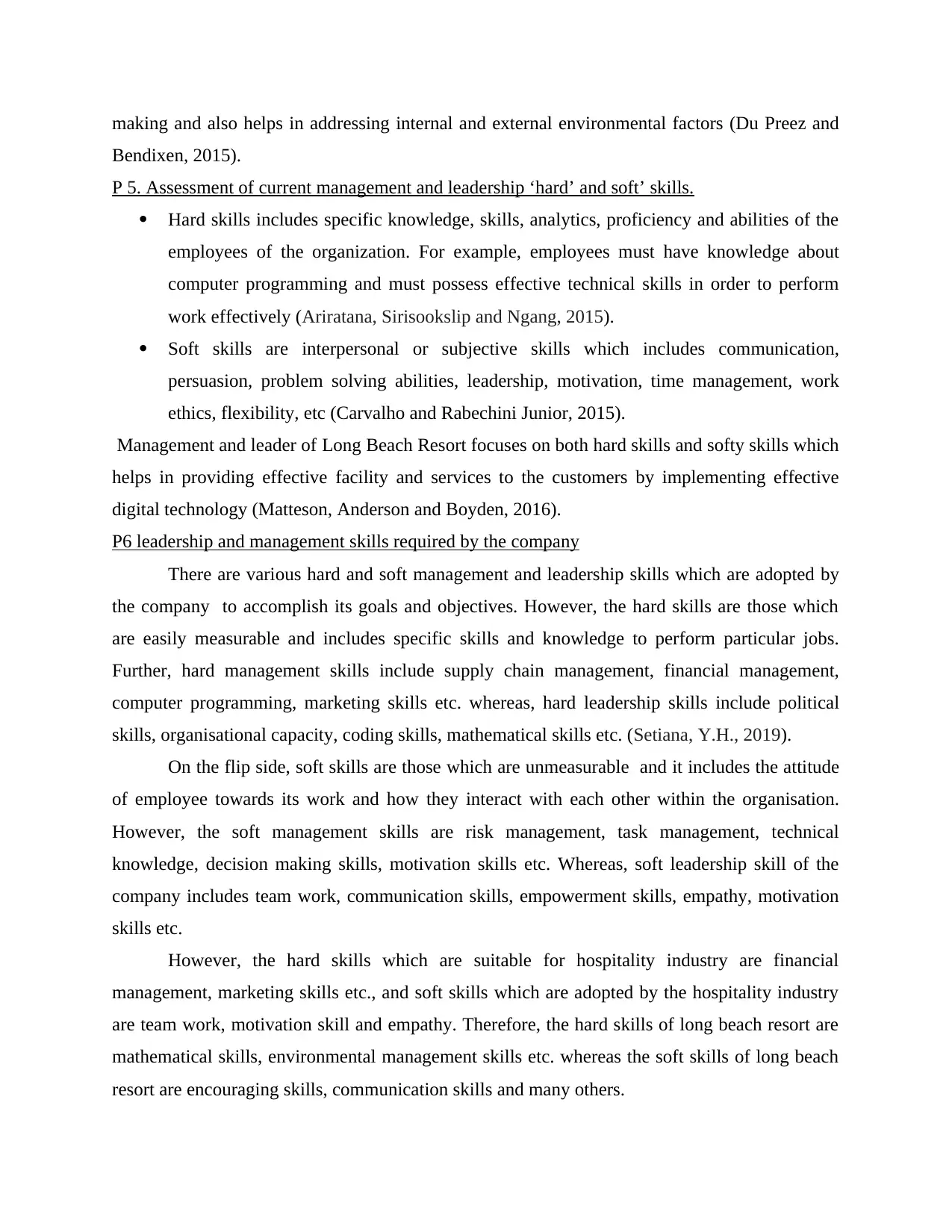
making and also helps in addressing internal and external environmental factors (Du Preez and
Bendixen, 2015).
P 5. Assessment of current management and leadership ‘hard’ and soft’ skills.
Hard skills includes specific knowledge, skills, analytics, proficiency and abilities of the
employees of the organization. For example, employees must have knowledge about
computer programming and must possess effective technical skills in order to perform
work effectively (Ariratana, Sirisookslip and Ngang, 2015).
Soft skills are interpersonal or subjective skills which includes communication,
persuasion, problem solving abilities, leadership, motivation, time management, work
ethics, flexibility, etc (Carvalho and Rabechini Junior, 2015).
Management and leader of Long Beach Resort focuses on both hard skills and softy skills which
helps in providing effective facility and services to the customers by implementing effective
digital technology (Matteson, Anderson and Boyden, 2016).
P6 leadership and management skills required by the company
There are various hard and soft management and leadership skills which are adopted by
the company to accomplish its goals and objectives. However, the hard skills are those which
are easily measurable and includes specific skills and knowledge to perform particular jobs.
Further, hard management skills include supply chain management, financial management,
computer programming, marketing skills etc. whereas, hard leadership skills include political
skills, organisational capacity, coding skills, mathematical skills etc. (Setiana, Y.H., 2019).
On the flip side, soft skills are those which are unmeasurable and it includes the attitude
of employee towards its work and how they interact with each other within the organisation.
However, the soft management skills are risk management, task management, technical
knowledge, decision making skills, motivation skills etc. Whereas, soft leadership skill of the
company includes team work, communication skills, empowerment skills, empathy, motivation
skills etc.
However, the hard skills which are suitable for hospitality industry are financial
management, marketing skills etc., and soft skills which are adopted by the hospitality industry
are team work, motivation skill and empathy. Therefore, the hard skills of long beach resort are
mathematical skills, environmental management skills etc. whereas the soft skills of long beach
resort are encouraging skills, communication skills and many others.
Bendixen, 2015).
P 5. Assessment of current management and leadership ‘hard’ and soft’ skills.
Hard skills includes specific knowledge, skills, analytics, proficiency and abilities of the
employees of the organization. For example, employees must have knowledge about
computer programming and must possess effective technical skills in order to perform
work effectively (Ariratana, Sirisookslip and Ngang, 2015).
Soft skills are interpersonal or subjective skills which includes communication,
persuasion, problem solving abilities, leadership, motivation, time management, work
ethics, flexibility, etc (Carvalho and Rabechini Junior, 2015).
Management and leader of Long Beach Resort focuses on both hard skills and softy skills which
helps in providing effective facility and services to the customers by implementing effective
digital technology (Matteson, Anderson and Boyden, 2016).
P6 leadership and management skills required by the company
There are various hard and soft management and leadership skills which are adopted by
the company to accomplish its goals and objectives. However, the hard skills are those which
are easily measurable and includes specific skills and knowledge to perform particular jobs.
Further, hard management skills include supply chain management, financial management,
computer programming, marketing skills etc. whereas, hard leadership skills include political
skills, organisational capacity, coding skills, mathematical skills etc. (Setiana, Y.H., 2019).
On the flip side, soft skills are those which are unmeasurable and it includes the attitude
of employee towards its work and how they interact with each other within the organisation.
However, the soft management skills are risk management, task management, technical
knowledge, decision making skills, motivation skills etc. Whereas, soft leadership skill of the
company includes team work, communication skills, empowerment skills, empathy, motivation
skills etc.
However, the hard skills which are suitable for hospitality industry are financial
management, marketing skills etc., and soft skills which are adopted by the hospitality industry
are team work, motivation skill and empathy. Therefore, the hard skills of long beach resort are
mathematical skills, environmental management skills etc. whereas the soft skills of long beach
resort are encouraging skills, communication skills and many others.
You're viewing a preview
Unlock full access by subscribing today!
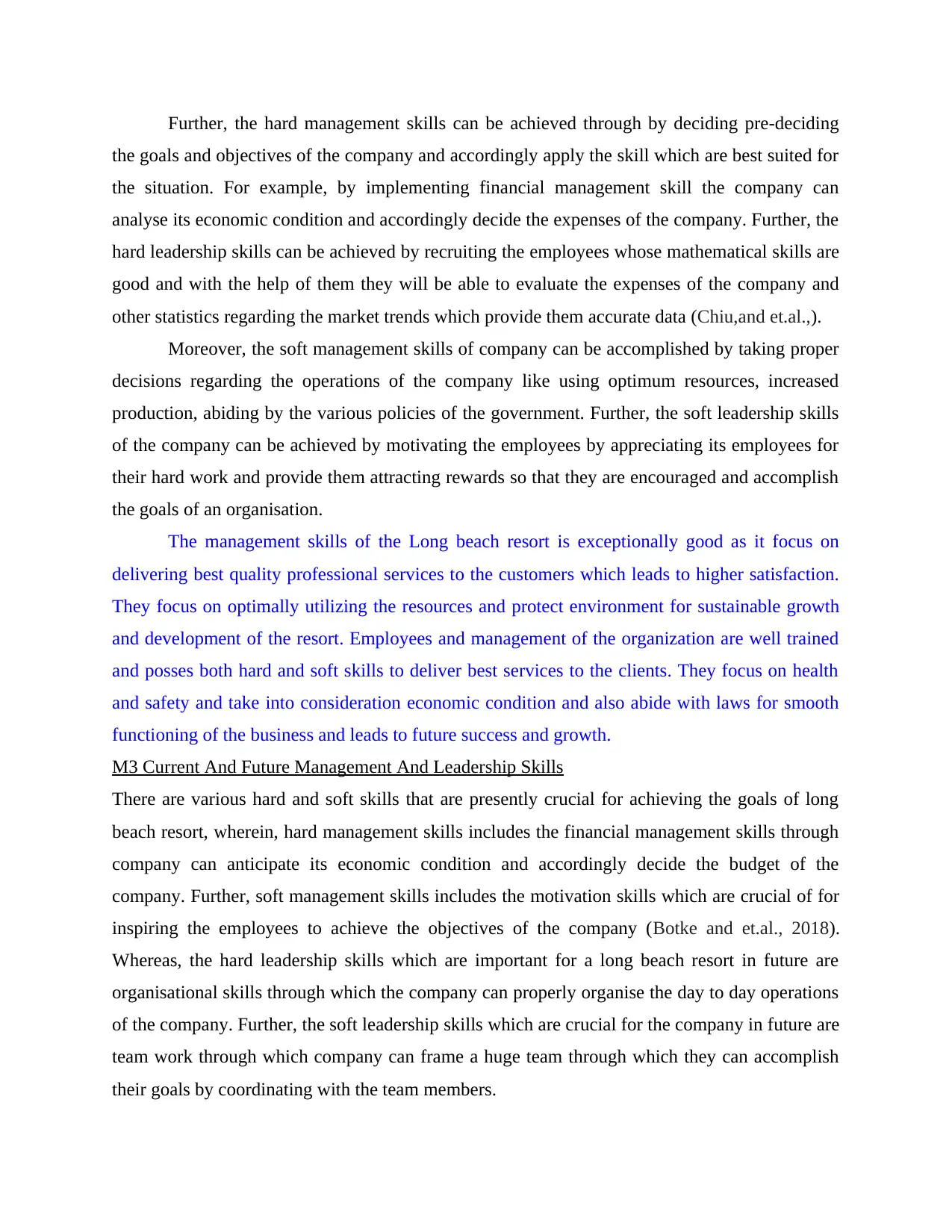
Further, the hard management skills can be achieved through by deciding pre-deciding
the goals and objectives of the company and accordingly apply the skill which are best suited for
the situation. For example, by implementing financial management skill the company can
analyse its economic condition and accordingly decide the expenses of the company. Further, the
hard leadership skills can be achieved by recruiting the employees whose mathematical skills are
good and with the help of them they will be able to evaluate the expenses of the company and
other statistics regarding the market trends which provide them accurate data (Chiu,and et.al.,).
Moreover, the soft management skills of company can be accomplished by taking proper
decisions regarding the operations of the company like using optimum resources, increased
production, abiding by the various policies of the government. Further, the soft leadership skills
of the company can be achieved by motivating the employees by appreciating its employees for
their hard work and provide them attracting rewards so that they are encouraged and accomplish
the goals of an organisation.
The management skills of the Long beach resort is exceptionally good as it focus on
delivering best quality professional services to the customers which leads to higher satisfaction.
They focus on optimally utilizing the resources and protect environment for sustainable growth
and development of the resort. Employees and management of the organization are well trained
and posses both hard and soft skills to deliver best services to the clients. They focus on health
and safety and take into consideration economic condition and also abide with laws for smooth
functioning of the business and leads to future success and growth.
M3 Current And Future Management And Leadership Skills
There are various hard and soft skills that are presently crucial for achieving the goals of long
beach resort, wherein, hard management skills includes the financial management skills through
company can anticipate its economic condition and accordingly decide the budget of the
company. Further, soft management skills includes the motivation skills which are crucial of for
inspiring the employees to achieve the objectives of the company (Botke and et.al., 2018).
Whereas, the hard leadership skills which are important for a long beach resort in future are
organisational skills through which the company can properly organise the day to day operations
of the company. Further, the soft leadership skills which are crucial for the company in future are
team work through which company can frame a huge team through which they can accomplish
their goals by coordinating with the team members.
the goals and objectives of the company and accordingly apply the skill which are best suited for
the situation. For example, by implementing financial management skill the company can
analyse its economic condition and accordingly decide the expenses of the company. Further, the
hard leadership skills can be achieved by recruiting the employees whose mathematical skills are
good and with the help of them they will be able to evaluate the expenses of the company and
other statistics regarding the market trends which provide them accurate data (Chiu,and et.al.,).
Moreover, the soft management skills of company can be accomplished by taking proper
decisions regarding the operations of the company like using optimum resources, increased
production, abiding by the various policies of the government. Further, the soft leadership skills
of the company can be achieved by motivating the employees by appreciating its employees for
their hard work and provide them attracting rewards so that they are encouraged and accomplish
the goals of an organisation.
The management skills of the Long beach resort is exceptionally good as it focus on
delivering best quality professional services to the customers which leads to higher satisfaction.
They focus on optimally utilizing the resources and protect environment for sustainable growth
and development of the resort. Employees and management of the organization are well trained
and posses both hard and soft skills to deliver best services to the clients. They focus on health
and safety and take into consideration economic condition and also abide with laws for smooth
functioning of the business and leads to future success and growth.
M3 Current And Future Management And Leadership Skills
There are various hard and soft skills that are presently crucial for achieving the goals of long
beach resort, wherein, hard management skills includes the financial management skills through
company can anticipate its economic condition and accordingly decide the budget of the
company. Further, soft management skills includes the motivation skills which are crucial of for
inspiring the employees to achieve the objectives of the company (Botke and et.al., 2018).
Whereas, the hard leadership skills which are important for a long beach resort in future are
organisational skills through which the company can properly organise the day to day operations
of the company. Further, the soft leadership skills which are crucial for the company in future are
team work through which company can frame a huge team through which they can accomplish
their goals by coordinating with the team members.
Paraphrase This Document
Need a fresh take? Get an instant paraphrase of this document with our AI Paraphraser
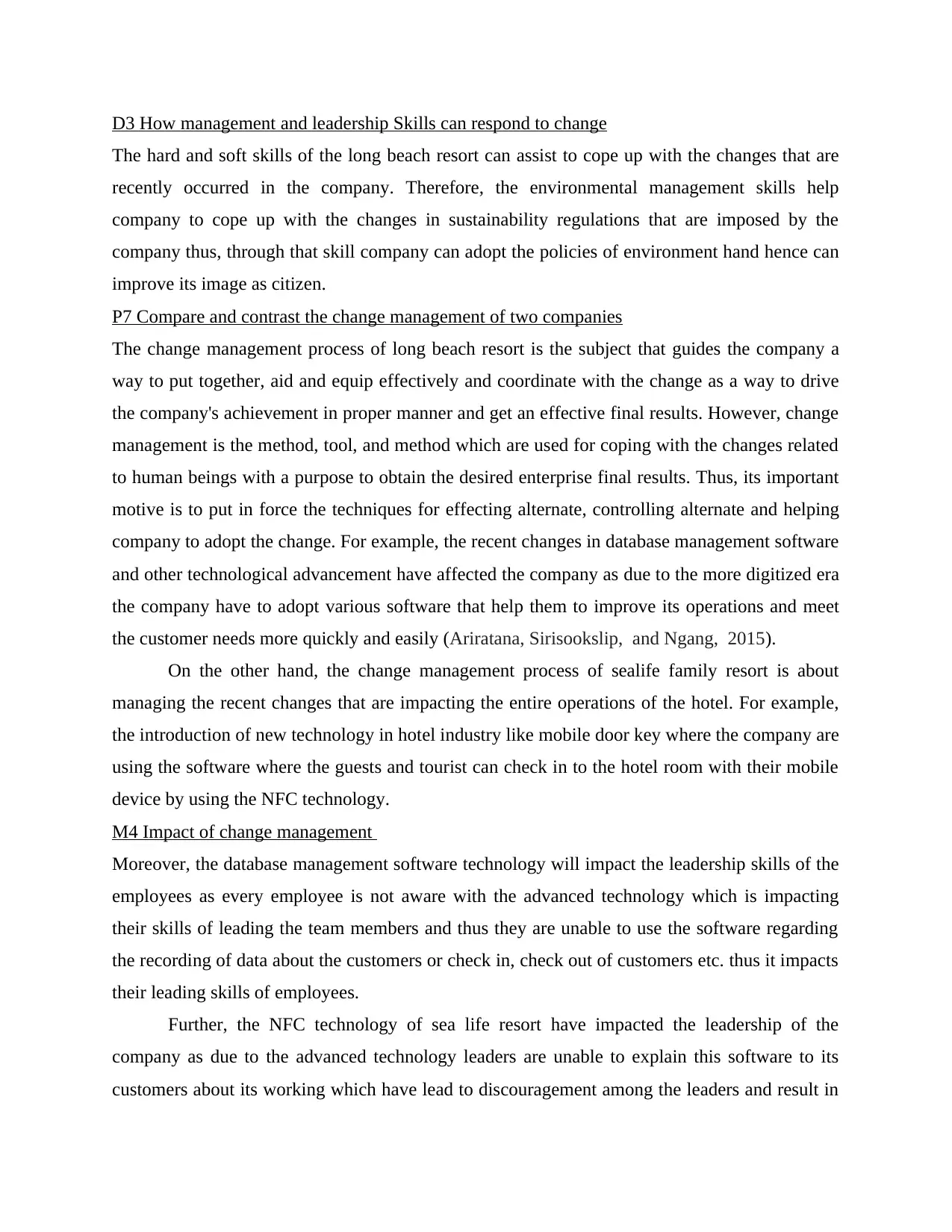
D3 How management and leadership Skills can respond to change
The hard and soft skills of the long beach resort can assist to cope up with the changes that are
recently occurred in the company. Therefore, the environmental management skills help
company to cope up with the changes in sustainability regulations that are imposed by the
company thus, through that skill company can adopt the policies of environment hand hence can
improve its image as citizen.
P7 Compare and contrast the change management of two companies
The change management process of long beach resort is the subject that guides the company a
way to put together, aid and equip effectively and coordinate with the change as a way to drive
the company's achievement in proper manner and get an effective final results. However, change
management is the method, tool, and method which are used for coping with the changes related
to human beings with a purpose to obtain the desired enterprise final results. Thus, its important
motive is to put in force the techniques for effecting alternate, controlling alternate and helping
company to adopt the change. For example, the recent changes in database management software
and other technological advancement have affected the company as due to the more digitized era
the company have to adopt various software that help them to improve its operations and meet
the customer needs more quickly and easily (Ariratana, Sirisookslip, and Ngang, 2015).
On the other hand, the change management process of sealife family resort is about
managing the recent changes that are impacting the entire operations of the hotel. For example,
the introduction of new technology in hotel industry like mobile door key where the company are
using the software where the guests and tourist can check in to the hotel room with their mobile
device by using the NFC technology.
M4 Impact of change management
Moreover, the database management software technology will impact the leadership skills of the
employees as every employee is not aware with the advanced technology which is impacting
their skills of leading the team members and thus they are unable to use the software regarding
the recording of data about the customers or check in, check out of customers etc. thus it impacts
their leading skills of employees.
Further, the NFC technology of sea life resort have impacted the leadership of the
company as due to the advanced technology leaders are unable to explain this software to its
customers about its working which have lead to discouragement among the leaders and result in
The hard and soft skills of the long beach resort can assist to cope up with the changes that are
recently occurred in the company. Therefore, the environmental management skills help
company to cope up with the changes in sustainability regulations that are imposed by the
company thus, through that skill company can adopt the policies of environment hand hence can
improve its image as citizen.
P7 Compare and contrast the change management of two companies
The change management process of long beach resort is the subject that guides the company a
way to put together, aid and equip effectively and coordinate with the change as a way to drive
the company's achievement in proper manner and get an effective final results. However, change
management is the method, tool, and method which are used for coping with the changes related
to human beings with a purpose to obtain the desired enterprise final results. Thus, its important
motive is to put in force the techniques for effecting alternate, controlling alternate and helping
company to adopt the change. For example, the recent changes in database management software
and other technological advancement have affected the company as due to the more digitized era
the company have to adopt various software that help them to improve its operations and meet
the customer needs more quickly and easily (Ariratana, Sirisookslip, and Ngang, 2015).
On the other hand, the change management process of sealife family resort is about
managing the recent changes that are impacting the entire operations of the hotel. For example,
the introduction of new technology in hotel industry like mobile door key where the company are
using the software where the guests and tourist can check in to the hotel room with their mobile
device by using the NFC technology.
M4 Impact of change management
Moreover, the database management software technology will impact the leadership skills of the
employees as every employee is not aware with the advanced technology which is impacting
their skills of leading the team members and thus they are unable to use the software regarding
the recording of data about the customers or check in, check out of customers etc. thus it impacts
their leading skills of employees.
Further, the NFC technology of sea life resort have impacted the leadership of the
company as due to the advanced technology leaders are unable to explain this software to its
customers about its working which have lead to discouragement among the leaders and result in
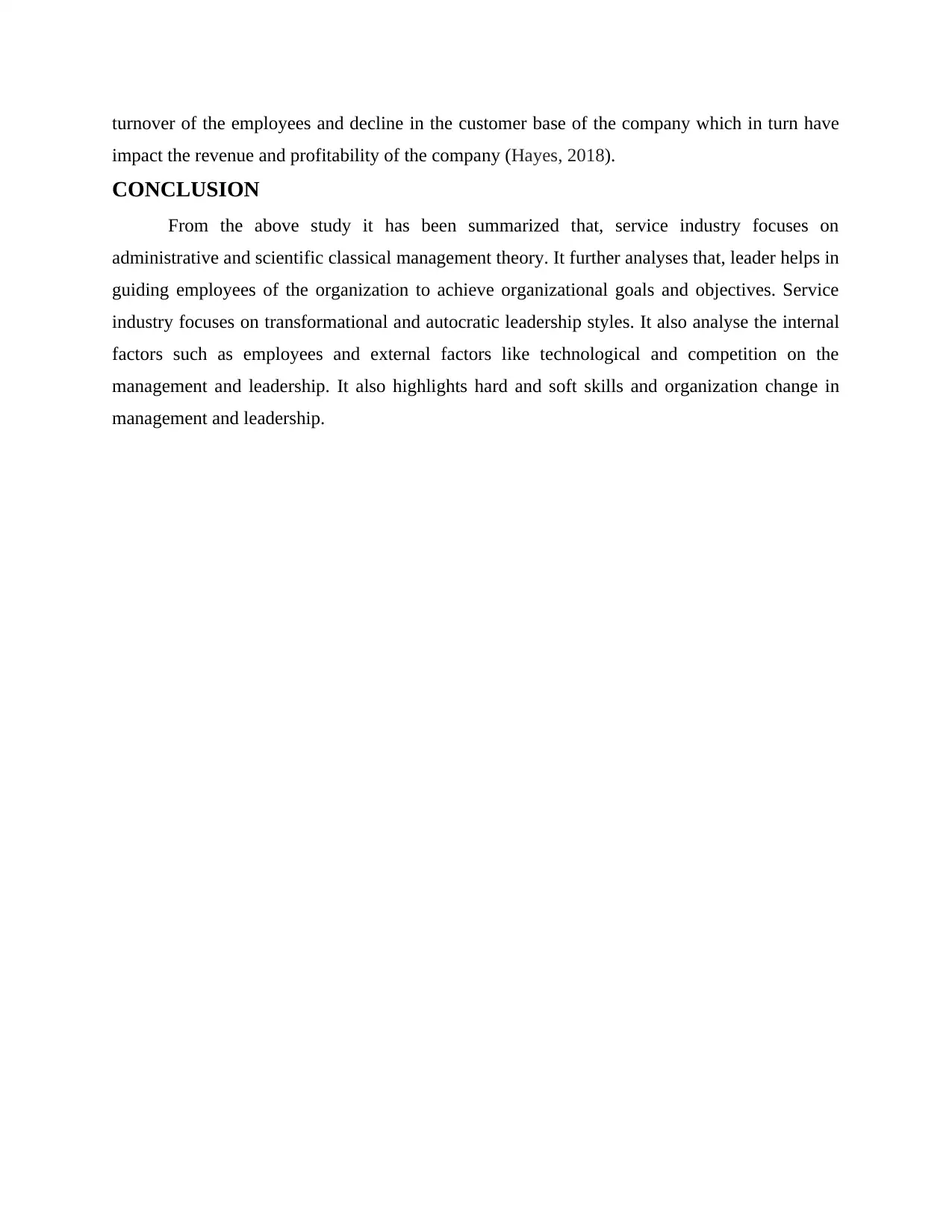
turnover of the employees and decline in the customer base of the company which in turn have
impact the revenue and profitability of the company (Hayes, 2018).
CONCLUSION
From the above study it has been summarized that, service industry focuses on
administrative and scientific classical management theory. It further analyses that, leader helps in
guiding employees of the organization to achieve organizational goals and objectives. Service
industry focuses on transformational and autocratic leadership styles. It also analyse the internal
factors such as employees and external factors like technological and competition on the
management and leadership. It also highlights hard and soft skills and organization change in
management and leadership.
impact the revenue and profitability of the company (Hayes, 2018).
CONCLUSION
From the above study it has been summarized that, service industry focuses on
administrative and scientific classical management theory. It further analyses that, leader helps in
guiding employees of the organization to achieve organizational goals and objectives. Service
industry focuses on transformational and autocratic leadership styles. It also analyse the internal
factors such as employees and external factors like technological and competition on the
management and leadership. It also highlights hard and soft skills and organization change in
management and leadership.
You're viewing a preview
Unlock full access by subscribing today!
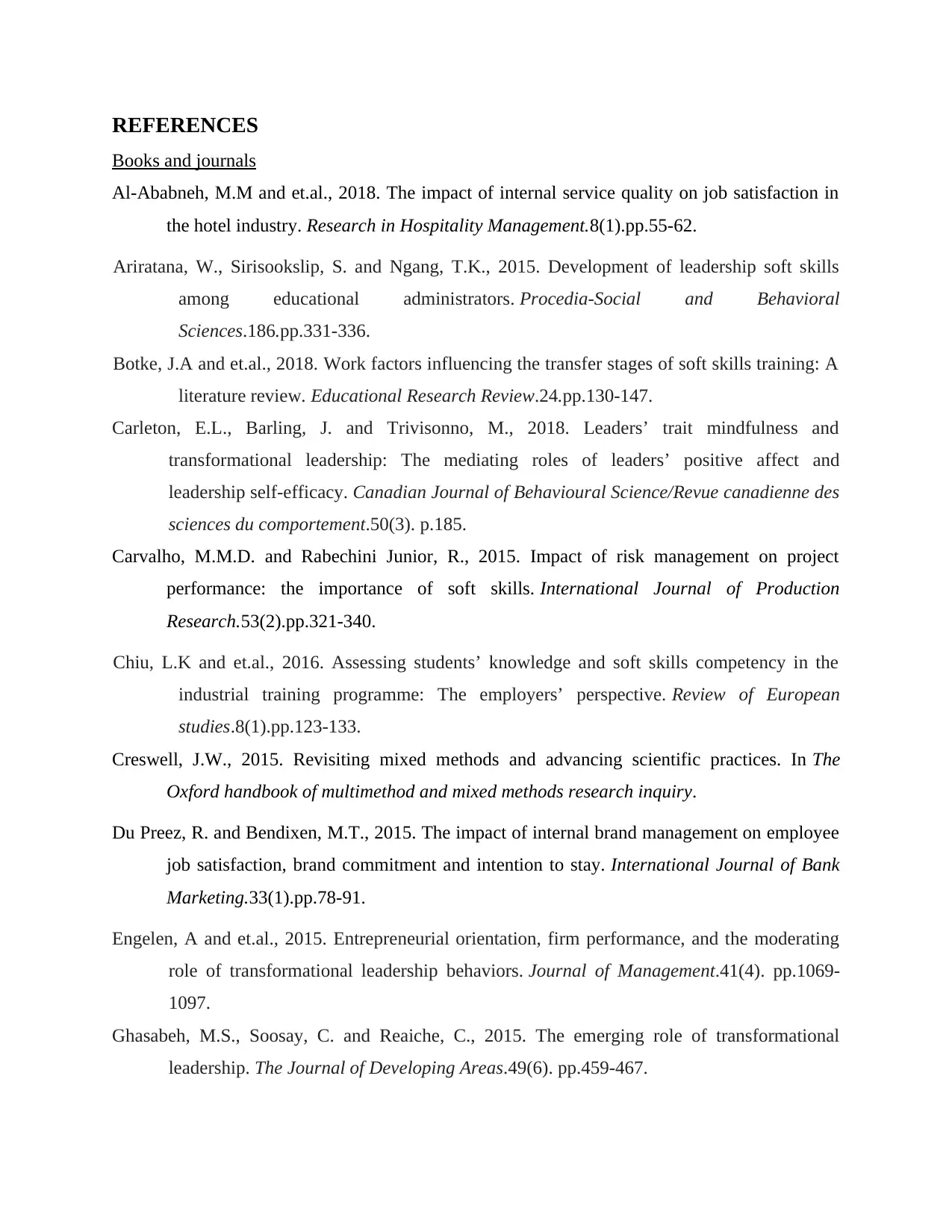
REFERENCES
Books and journals
Al-Ababneh, M.M and et.al., 2018. The impact of internal service quality on job satisfaction in
the hotel industry. Research in Hospitality Management.8(1).pp.55-62.
Ariratana, W., Sirisookslip, S. and Ngang, T.K., 2015. Development of leadership soft skills
among educational administrators. Procedia-Social and Behavioral
Sciences.186.pp.331-336.
Botke, J.A and et.al., 2018. Work factors influencing the transfer stages of soft skills training: A
literature review. Educational Research Review.24.pp.130-147.
Carleton, E.L., Barling, J. and Trivisonno, M., 2018. Leaders’ trait mindfulness and
transformational leadership: The mediating roles of leaders’ positive affect and
leadership self-efficacy. Canadian Journal of Behavioural Science/Revue canadienne des
sciences du comportement.50(3). p.185.
Carvalho, M.M.D. and Rabechini Junior, R., 2015. Impact of risk management on project
performance: the importance of soft skills. International Journal of Production
Research.53(2).pp.321-340.
Chiu, L.K and et.al., 2016. Assessing students’ knowledge and soft skills competency in the
industrial training programme: The employers’ perspective. Review of European
studies.8(1).pp.123-133.
Creswell, J.W., 2015. Revisiting mixed methods and advancing scientific practices. In The
Oxford handbook of multimethod and mixed methods research inquiry.
Du Preez, R. and Bendixen, M.T., 2015. The impact of internal brand management on employee
job satisfaction, brand commitment and intention to stay. International Journal of Bank
Marketing.33(1).pp.78-91.
Engelen, A and et.al., 2015. Entrepreneurial orientation, firm performance, and the moderating
role of transformational leadership behaviors. Journal of Management.41(4). pp.1069-
1097.
Ghasabeh, M.S., Soosay, C. and Reaiche, C., 2015. The emerging role of transformational
leadership. The Journal of Developing Areas.49(6). pp.459-467.
Books and journals
Al-Ababneh, M.M and et.al., 2018. The impact of internal service quality on job satisfaction in
the hotel industry. Research in Hospitality Management.8(1).pp.55-62.
Ariratana, W., Sirisookslip, S. and Ngang, T.K., 2015. Development of leadership soft skills
among educational administrators. Procedia-Social and Behavioral
Sciences.186.pp.331-336.
Botke, J.A and et.al., 2018. Work factors influencing the transfer stages of soft skills training: A
literature review. Educational Research Review.24.pp.130-147.
Carleton, E.L., Barling, J. and Trivisonno, M., 2018. Leaders’ trait mindfulness and
transformational leadership: The mediating roles of leaders’ positive affect and
leadership self-efficacy. Canadian Journal of Behavioural Science/Revue canadienne des
sciences du comportement.50(3). p.185.
Carvalho, M.M.D. and Rabechini Junior, R., 2015. Impact of risk management on project
performance: the importance of soft skills. International Journal of Production
Research.53(2).pp.321-340.
Chiu, L.K and et.al., 2016. Assessing students’ knowledge and soft skills competency in the
industrial training programme: The employers’ perspective. Review of European
studies.8(1).pp.123-133.
Creswell, J.W., 2015. Revisiting mixed methods and advancing scientific practices. In The
Oxford handbook of multimethod and mixed methods research inquiry.
Du Preez, R. and Bendixen, M.T., 2015. The impact of internal brand management on employee
job satisfaction, brand commitment and intention to stay. International Journal of Bank
Marketing.33(1).pp.78-91.
Engelen, A and et.al., 2015. Entrepreneurial orientation, firm performance, and the moderating
role of transformational leadership behaviors. Journal of Management.41(4). pp.1069-
1097.
Ghasabeh, M.S., Soosay, C. and Reaiche, C., 2015. The emerging role of transformational
leadership. The Journal of Developing Areas.49(6). pp.459-467.
Paraphrase This Document
Need a fresh take? Get an instant paraphrase of this document with our AI Paraphraser
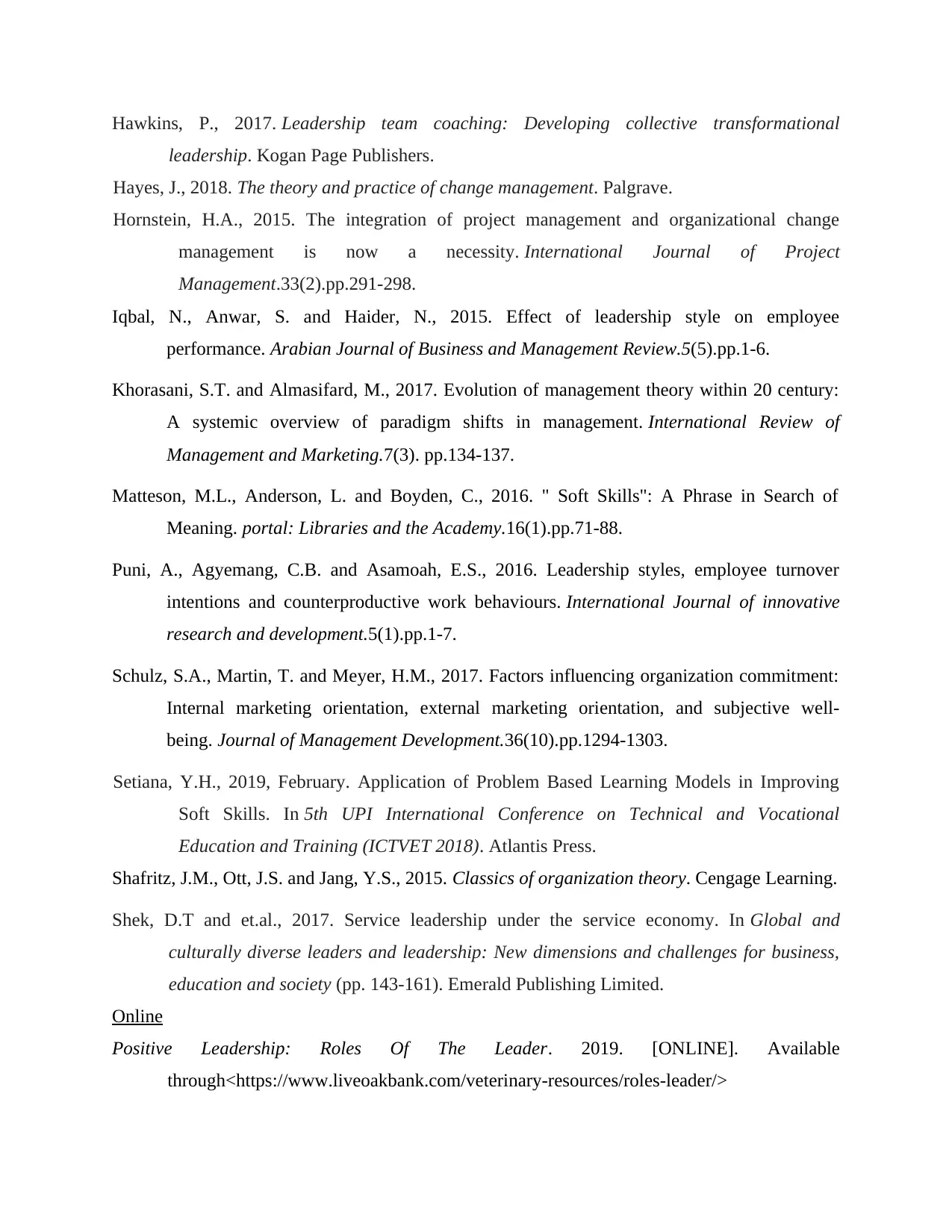
Hawkins, P., 2017. Leadership team coaching: Developing collective transformational
leadership. Kogan Page Publishers.
Hayes, J., 2018. The theory and practice of change management. Palgrave.
Hornstein, H.A., 2015. The integration of project management and organizational change
management is now a necessity. International Journal of Project
Management.33(2).pp.291-298.
Iqbal, N., Anwar, S. and Haider, N., 2015. Effect of leadership style on employee
performance. Arabian Journal of Business and Management Review.5(5).pp.1-6.
Khorasani, S.T. and Almasifard, M., 2017. Evolution of management theory within 20 century:
A systemic overview of paradigm shifts in management. International Review of
Management and Marketing.7(3). pp.134-137.
Matteson, M.L., Anderson, L. and Boyden, C., 2016. " Soft Skills": A Phrase in Search of
Meaning. portal: Libraries and the Academy.16(1).pp.71-88.
Puni, A., Agyemang, C.B. and Asamoah, E.S., 2016. Leadership styles, employee turnover
intentions and counterproductive work behaviours. International Journal of innovative
research and development.5(1).pp.1-7.
Schulz, S.A., Martin, T. and Meyer, H.M., 2017. Factors influencing organization commitment:
Internal marketing orientation, external marketing orientation, and subjective well-
being. Journal of Management Development.36(10).pp.1294-1303.
Setiana, Y.H., 2019, February. Application of Problem Based Learning Models in Improving
Soft Skills. In 5th UPI International Conference on Technical and Vocational
Education and Training (ICTVET 2018). Atlantis Press.
Shafritz, J.M., Ott, J.S. and Jang, Y.S., 2015. Classics of organization theory. Cengage Learning.
Shek, D.T and et.al., 2017. Service leadership under the service economy. In Global and
culturally diverse leaders and leadership: New dimensions and challenges for business,
education and society (pp. 143-161). Emerald Publishing Limited.
Online
Positive Leadership: Roles Of The Leader. 2019. [ONLINE]. Available
through<https://www.liveoakbank.com/veterinary-resources/roles-leader/>
leadership. Kogan Page Publishers.
Hayes, J., 2018. The theory and practice of change management. Palgrave.
Hornstein, H.A., 2015. The integration of project management and organizational change
management is now a necessity. International Journal of Project
Management.33(2).pp.291-298.
Iqbal, N., Anwar, S. and Haider, N., 2015. Effect of leadership style on employee
performance. Arabian Journal of Business and Management Review.5(5).pp.1-6.
Khorasani, S.T. and Almasifard, M., 2017. Evolution of management theory within 20 century:
A systemic overview of paradigm shifts in management. International Review of
Management and Marketing.7(3). pp.134-137.
Matteson, M.L., Anderson, L. and Boyden, C., 2016. " Soft Skills": A Phrase in Search of
Meaning. portal: Libraries and the Academy.16(1).pp.71-88.
Puni, A., Agyemang, C.B. and Asamoah, E.S., 2016. Leadership styles, employee turnover
intentions and counterproductive work behaviours. International Journal of innovative
research and development.5(1).pp.1-7.
Schulz, S.A., Martin, T. and Meyer, H.M., 2017. Factors influencing organization commitment:
Internal marketing orientation, external marketing orientation, and subjective well-
being. Journal of Management Development.36(10).pp.1294-1303.
Setiana, Y.H., 2019, February. Application of Problem Based Learning Models in Improving
Soft Skills. In 5th UPI International Conference on Technical and Vocational
Education and Training (ICTVET 2018). Atlantis Press.
Shafritz, J.M., Ott, J.S. and Jang, Y.S., 2015. Classics of organization theory. Cengage Learning.
Shek, D.T and et.al., 2017. Service leadership under the service economy. In Global and
culturally diverse leaders and leadership: New dimensions and challenges for business,
education and society (pp. 143-161). Emerald Publishing Limited.
Online
Positive Leadership: Roles Of The Leader. 2019. [ONLINE]. Available
through<https://www.liveoakbank.com/veterinary-resources/roles-leader/>
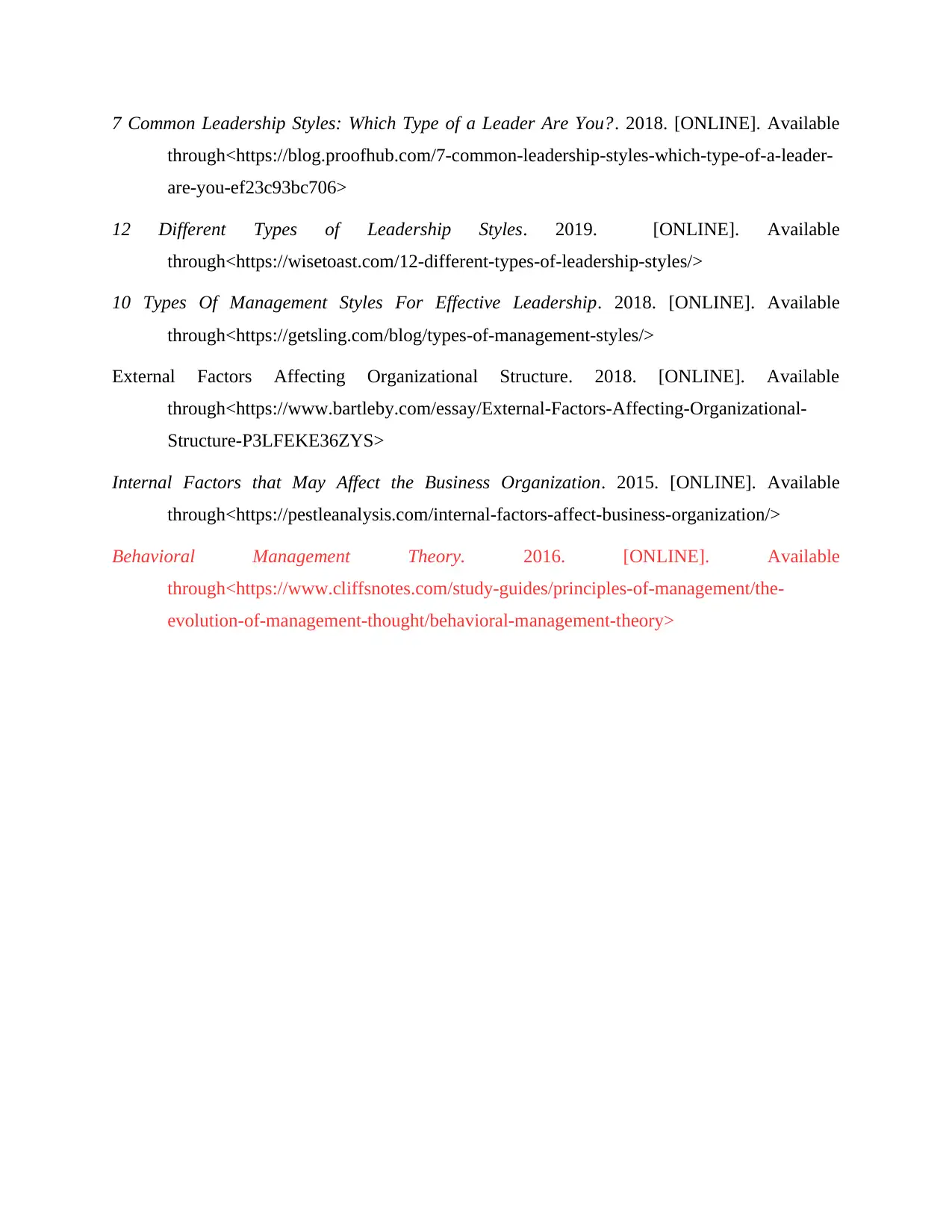
7 Common Leadership Styles: Which Type of a Leader Are You?. 2018. [ONLINE]. Available
through<https://blog.proofhub.com/7-common-leadership-styles-which-type-of-a-leader-
are-you-ef23c93bc706>
12 Different Types of Leadership Styles. 2019. [ONLINE]. Available
through<https://wisetoast.com/12-different-types-of-leadership-styles/>
10 Types Of Management Styles For Effective Leadership. 2018. [ONLINE]. Available
through<https://getsling.com/blog/types-of-management-styles/>
External Factors Affecting Organizational Structure. 2018. [ONLINE]. Available
through<https://www.bartleby.com/essay/External-Factors-Affecting-Organizational-
Structure-P3LFEKE36ZYS>
Internal Factors that May Affect the Business Organization. 2015. [ONLINE]. Available
through<https://pestleanalysis.com/internal-factors-affect-business-organization/>
Behavioral Management Theory. 2016. [ONLINE]. Available
through<https://www.cliffsnotes.com/study-guides/principles-of-management/the-
evolution-of-management-thought/behavioral-management-theory>
through<https://blog.proofhub.com/7-common-leadership-styles-which-type-of-a-leader-
are-you-ef23c93bc706>
12 Different Types of Leadership Styles. 2019. [ONLINE]. Available
through<https://wisetoast.com/12-different-types-of-leadership-styles/>
10 Types Of Management Styles For Effective Leadership. 2018. [ONLINE]. Available
through<https://getsling.com/blog/types-of-management-styles/>
External Factors Affecting Organizational Structure. 2018. [ONLINE]. Available
through<https://www.bartleby.com/essay/External-Factors-Affecting-Organizational-
Structure-P3LFEKE36ZYS>
Internal Factors that May Affect the Business Organization. 2015. [ONLINE]. Available
through<https://pestleanalysis.com/internal-factors-affect-business-organization/>
Behavioral Management Theory. 2016. [ONLINE]. Available
through<https://www.cliffsnotes.com/study-guides/principles-of-management/the-
evolution-of-management-thought/behavioral-management-theory>
You're viewing a preview
Unlock full access by subscribing today!
1 out of 18
Related Documents
Your All-in-One AI-Powered Toolkit for Academic Success.
+13062052269
info@desklib.com
Available 24*7 on WhatsApp / Email
![[object Object]](/_next/static/media/star-bottom.7253800d.svg)
Unlock your academic potential
© 2024 | Zucol Services PVT LTD | All rights reserved.



